Selfullness

Paul Cézanne: Self-Portrait (1898)
“I’ll be studying and learning this lesson for the rest of a halfway Decent lifetime.”
Brian was always the brightest person in any group he worked with. He naturally gravitated toward performing in a pivotal role, often as a leader. If not the formally-declared leader, then the most widely-acknowledged one. He was, by any measure, an enormously Decent person, patient, often to a fault, and extraordinarily kind. He promoted The Muse and my work, sponsoring some workshops and championing our perspectives. He mentored many. When our business went bust, The Muse found a real job, primarily on the strength of Brian’s lead and his firm, supportive recommendation. He worked unimaginable hours, routinely arriving early, leaving late, and working weekends. He developed the habit of never taking vacations, since he was really the critical presence when one of his dozen or more projects faced a significant milestone. Something was always facing another critical milestone review.
HR finally confronted him after he’d accumulated three months of unused vacation time.
Weekly Writing Summary For The Week Ending 12/18/2025

Bartolomeo Pinelli: The Author's Family (1810)
In reflection, this writing week delved more deeply into Decency's philosophical underpinnings than had any previous writing week in this series. As I near the end of this series—only two more installments remain—it might make sense that Decency gets reduced to the philosophical it might actually be, though I consider it more an ethical philosophy than a necessarily moral one. The distinction, since I'm already delving into the deeply philosophical, lies in who directs the action. In moral action, it seems somebody else directs by commanding, "Thou Shalt." In ethical action, the actor directs the action and stars in the performance. Decency seems to be necessarily self-directed action.
I began this writing week avoiding providing instruction, instead simply reflecting "On Being" Decent.
Excluding

Honoré Victorin Daumier: An Excusable Error. Chickens thinking they have found the cage where they spent their early childhood, plate 21 from La Crinolomanie (1857)
ABOUT THIS ARTWORK
This lithograph focuses on the outlandish crinoline fashion, which lasted about a decade. Among other activities, Daumier’s exuberant crinolines destroy gardens, sweep up street trash, and catch their wearers in high winds and turnstiles. While this plate comes from the Actualités series, it has also been catalogued under the topic La crinolomanie (Crinoline Mania). This sheet and others by Daumier play on the support garment’s incongruous approximation of the human form. Daumier’s images stress that these contraptions, whether cage- or basket- like, were functionally useless.
—- —
"…we can curl up in wonder…"
The hospitality industry has finally become the least hospitable industry. I intend no artificial irony as I declare this obvious truth, just the old-fashioned kind of irony. What could be more Decent than hospitality? Perhaps nothing, unless it’s turned on its head. It has been turned on its head by seemingly everyone working in that most curious of industries. Hospitality seems an odd industry, anyway, because I can’t see smoke stacks protruding from whatever hospitality might be doing, and I think that I really should see smoke stacks protruding from the top of any Decent industry, even hospitality, if it actually imagines itself to be an industry.
In my day, even a half-decent industry featured assembly lines and efficiency experts.
FauxDecency

Jan Sadeler I: The False Shepherd (c. 1575)
"…I'd prefer to believe most would perceive such beliefs the utter opposite of Decency in action."
If Decency has always been a matter of choice, what constrains such decisions? I see today a proliferation of what I must characterize as poor choices made in the name of what I can’t quite comprehend as representing Decency in action. Our State Department’s embassies recently received a directive from the White House declaring that every country practicing Diversity, Equity, or Inclusion is guilty of human rights abuses. Likewise, those acknowledging their women’s right to choose. These pronouncements seem the very opposite of Decency. Decency stood on its head and turned inside-out: FauxDecency. I would live and let live in this instance except this instance seems a perverse exception, and it is the perversion that drives my aversion. This cannot represent Decency, even as practiced on Mars, or else Decency itself becomes a meaningless concept in practice.
The vast army of whacko right-wing conspiracy believists are not theorists, for they seem to firmly believe that their wickedness represents true righteousness.
AlternativeFutures

Edward King: A future politician (1874)
"Decency’s probably more resilient than even the most practiced cynicism."
My old colleague and friend, Al, who has followed my writing for about thirty years, reminds me after reading my recent story featuring pointed comments about cynicism that, as a species, we seem to be much better at predicting long recoveries than at experiencing them. He contends that most systems recover much more quickly than their intimates predicted. This pessimism about our resiliency might fuel much despondency. As we watch what we consider Decency crumbling before us, we do more than just order handbaskets. We believe we might never recover from this latest round of insults, even though our history seems resplendent with examples of more rapid recovery. Even if we held the power to regenerate a severed limb spontaneously, we wouldn’t necessarily relish the experience. We might come to believe that we were more finite than we’d ever actually been, and confidently predict that any individual lobbing off would do us in.
We are already recovering from these latest insults, even as the wolves continue devouring so much of what we hold so dear.
BecomingComplicit

Anneliese Hager: Untitled [Portrait A. H.] (1947)
"Attempting to live Decently incurs ever more complicity."
To live is to become complicit. Attempting to live Decently only deepens this dilemma, for one may not insist upon society respecting one’s personal proclivities. Vegans surround themselves with murderers. Choosing to live Decently distances one from some, though it might also bring others closer. The least common denominator seems as unconscionable as it also seems most divisive. No way exists to avoid experiencing this division. The higher the aspiration, the lower the everyday experience. I have cordoned off vast swaths of my community as unworthy of my presence. I won’t shop at Walmart because of their disgustingly indecent business policies toward those they euphemistically call “Their Partners.” I won’t visit the Tractor Supply store since they tried to gain street cred by noisily cancelling their Diversity, Equity, and Inclusion policies under the phony guise of promoting actual equality. I was not born yesterday.
The more I embraced Decency, the more complicit I became.
DeSensing

Louis-Léopold Boilly: The Five Senses (1823)
"Decency primarily exists in the cloudy eyes of its beholders."
Decency requires certain sensitivities before it can be successfully deployed. One must accurately perceive one’s surroundings before one can engage congruently. Imperfections can create divergences such that Decencies escape my ability to properly muster them. I increasingly exist out of context, disconnected from the surrounding world.
Early on, I sensed that this world was someone else’s.
OnBeingDecent...

Giuseppe Maria Mitelli Allegory of the Lightness of Being (1702)
Gallery Notes: This elegantly attired nobleman – who is young (giovine), handsome (bello) and rich (ricco) – flaunts his possessions. His affluence is emphasized by the pile of gold coins on the table and the many costly attributes of art, gaming, and diversions that literally surround him. Yet apparently this is not enough. Amid all this opulence, he looks disillusioned and unsatisfied. Is this all there is?
"Decency's question is rarely what but when."
On Being Decent … In Indecent Places
I can speak with authority only about my personal experiences, and even that ability seems limited. I have nothing to teach anyone else, except by example, often by bad example. I am no paragon of anything except not being a paragon of anything. This context says nothing about the content of whatever I consider here, for I consider here to present an example of considering, not necessarily to conclude anything. That said, I have been writing Decency Stories for eighty-two consecutive days, discovering more than declaiming, sometimes seemingly shaming myself in the process. I have stumbled into contradictions and many tenacious misconceptions, realizing how little I understood the topic of my efforts. As I near the end of this series, I realize that I probably won’t be offering any crisp summarization of my subject at the end. I didn’t intend this effort to reduce understanding into a spare handful, but to expand it. It has proven more expansive than I could have imagined when I began.
One prominent subtext, though, that many of these stories have shown, involves one of the more common yet perplexing situations: On Being Decent In Indecent Places, not How To Be Decent In Indecent Places, but “merely” On Being Decent.
Weekly Writing Summary For The Week Ending 12/11/2025

Carl Gottlieb Guttenberg: The Public Scribe [L'ecrivain public] (1783)
This writing week proved to be a relatively quiet roller coaster ride with highs and lows properly attenuated and ultimately, unsurprisingly, unanticipated. Little happened as I’d either hoped or feared, so much for prescience and good fortune. I’m coming close to concluding that we’re not the deciding factor here; we might thrive on synchronicity and luck, whether good or bad, but ultimately beyond our ability to influence. The fact that we feel an innate ability to control only makes this roller coaster ride more entertaining as our expectations repeatedly and ultimately, thankfully, disappoint our expectations. We should be both well used to and warmly accepting of these disappointments that visit us when we don’t immediately realize that our prescience so frequently fails us.
Decency was not as I'd expected it to manifest.
CynicismProofing

Gaston Lachaise: Self-Portrait (20th century)
"I will mount my defence against encroaching seasonal cynicism with some Decent poems."
I believe that there’s only one essential battle fully worthy of human engagement, the eternal battle against cynicism. Cynicism has always been humanity’s greatest foe. It possesses strange attractors, though. It tends to interest those who have grown weary of the utter predictability of existence, those who convince themselves that they can see through “the game.” Those who contend that they play no game play the most encumbering one of all. The utter predictability of life can sometimes seem like a curse. Three score and ten, give or take, including the genuine risk of an early demise. The galling impermanence of existence off-puts. Those who fain invulnerability embody only cynicism. They project what they claim to oppose by merely breaking rules, as if liberty were little more than a tenacious inability to get along with anybody else.
After a dog-year downwind from utter incompetence, this witness to the attempted reintroduction of cynicism into our governance finds himself exhausted from the unending exertion.
InPractice
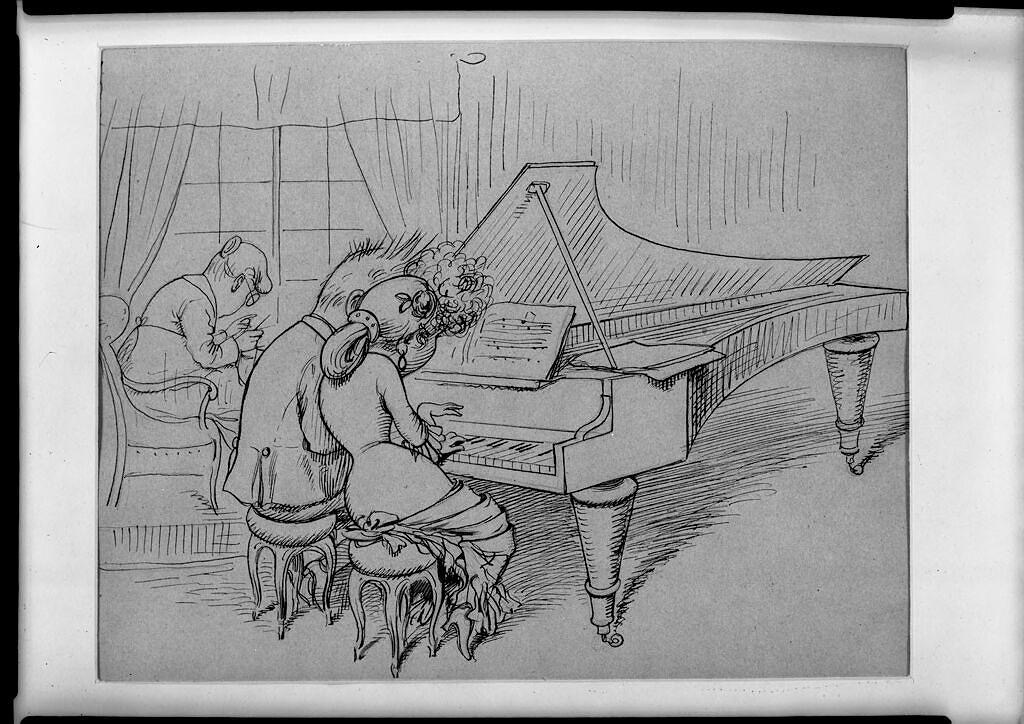
Adolf Oberlaender: The Piano's Revenge: Practice (1882)
"I might have initiated this enquiry only to continue it ad infinitum, InPractice."
I should not feel so surprised when I stumble upon the discovery that Decency, like every other concept, only manifests InPractice. In theory, it seems to contradict itself. Only InPractice does it exhibit its underlying nature, which proves to be indescribable. The description clearly ain’t the thing. InPractice, Decency seems to exhibit little if any ‘thingness.’ Not natively being either person, place, or thing, it steadfastly sidesteps all attempts at facile description, let alone definition. I suppose its dictionary definition performs as well as any dictionary definition might aspire to, though, as I believe I’ve shown in this series so far, much variation swirls around the concept’s central core. Decency can never manifest contextlessly. In fact, Decency seems unusually dependent upon well-formed context to exhibit much of any meaning at all.
You might not notice it when it exhibits.
Endimbenment

Unknown Tibeto-Chinese Artist:
Enlightened Protector Mahakala with Six Arms [Shadbhuja] (18th/19th century)
"Certainty must certainly be the surest sign of ignorance."
Acquiring knowledge and understanding never occurs as advertised. I understood that I would be acquiring something and come to know as a result of my efforts, but the outcome seems to reliably be different than either of those. Determining the endpoint, when such searches are finished, proves challenging, and applying what I learn, even more so, for it seems that I acquire much less, but also much different, than I expected. Even when I adjust my expectations beforehand, based upon my long and disappointed experience, the result underwhelms me. It always seems much simpler than it should properly seem and also much more complicated. I tend to find myself incapable of explaining what I experienced, what I definitively learned. I feel more humbled than haughty.
It’s little wonder why the uneducated look down their noses at eggheads, for the learnéd among us have suffered a shit ton more humility than have the great unwashed.
DecentPeople

Vincent van Gogh: The Drinkers (1890)
ABOUT THIS ARTWORK
During his time in the Asylum of Saint-Paul in Saint-Rémy, a small town near Arles, Vincent van Gogh made a number of copies of the work of artists he admired, which freed him from having to produce original compositions and allowed him to concentrate instead on interpretation. For this image, Van Gogh copied a wood engraving from Honoré Daumier’s Drinkers, a parody on the four ages of man. The exaggerated figure types capture Daumier’s characteristic humor and convey his sad message about the horrors of alcoholism. The greenish palette may well be an allusion to the notorious alcoholic drink absinthe.
— — —
"My Decencies seem as fleeting as my days."
People seem to have a deep need to classify each other into categories. A deep need for self-esteem might drive this tendency, though there must be better ways for us to feel good about ourselves. This practice seems the likely source of prejudice, misogyny, and a startling list of the more prominent human frailties. I wonder why we couldn’t be generally better than this, since we hold the capacity to make finer judgments and even to choose to make no judgments at all. Would it kill us to make fewer judgments under some ‘judge not, lest ye be judged’ rule? I suspect so.
I feel embarrassed to acknowledge that, in this whole series, of which this writing finds me 85% finished, I have been spouting deep antipathy toward a class I labeled Indecent without clearly defining who belonged to that group.
SelfDeception
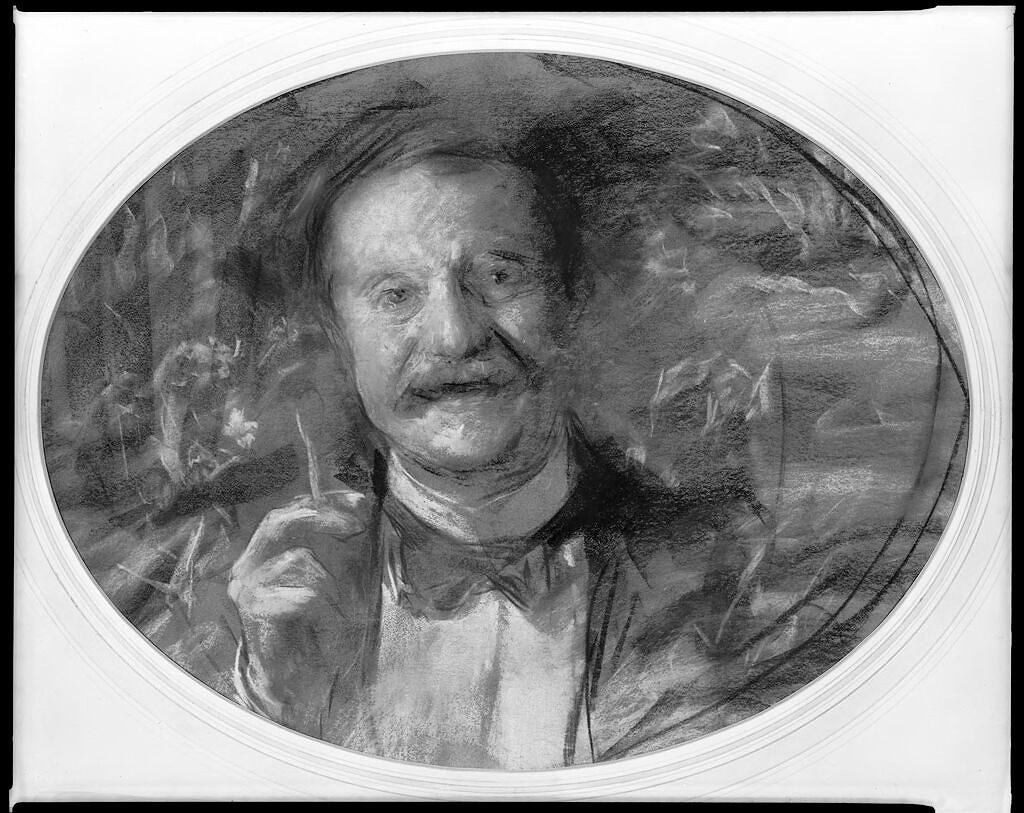
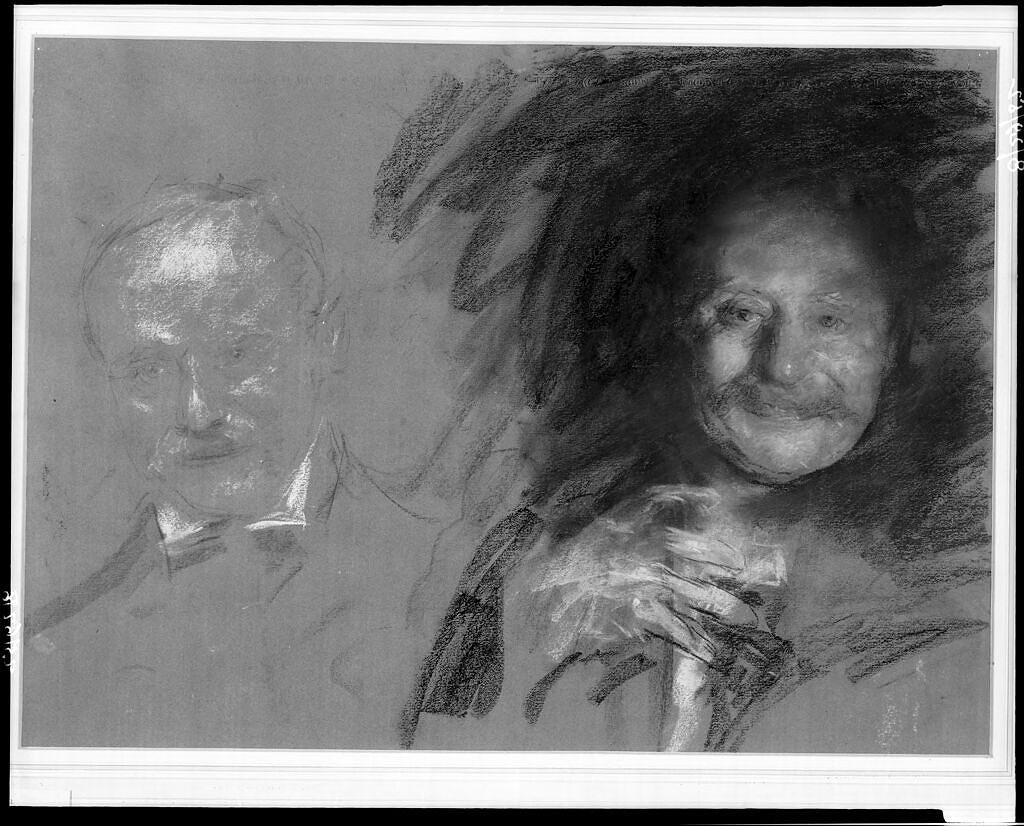
Antonio Mancini: Self Portrait; verso: Two Self Portraits (c. 1900-1902)
"The difference between Decencies might not matter as much as the intensity of each audience member's suspended disbelief, not to mention the actors'."
Discussions of Decency rarely mention the essential role that SelfDeception plays in its daily practice. Unlike a character in a novel or history, the Decent must wrestle with all the complexities and contradictions inherent in any practice. From one minute to the next, conditions might change, disrupting an intended trajectory. So, while one hears plenty of talk about choosing a path, one only rarely hears stories of having to pick and then continually choose again and again. There sometimes seems to be no end to the choosing when it comes to Decency. This can become understandably frustrating, with some loss of focus and discipline seeming common. The Decency originally intended can sometimes get twisted in delivery and manifest in rather embarrassing ways. A Decent SelfDeception might kick in then, to preserve self-esteem. The story remembered often seems divergent from the story as initially intended and executed.
Lapses in discipline are not uncommon.
HarshJudgments
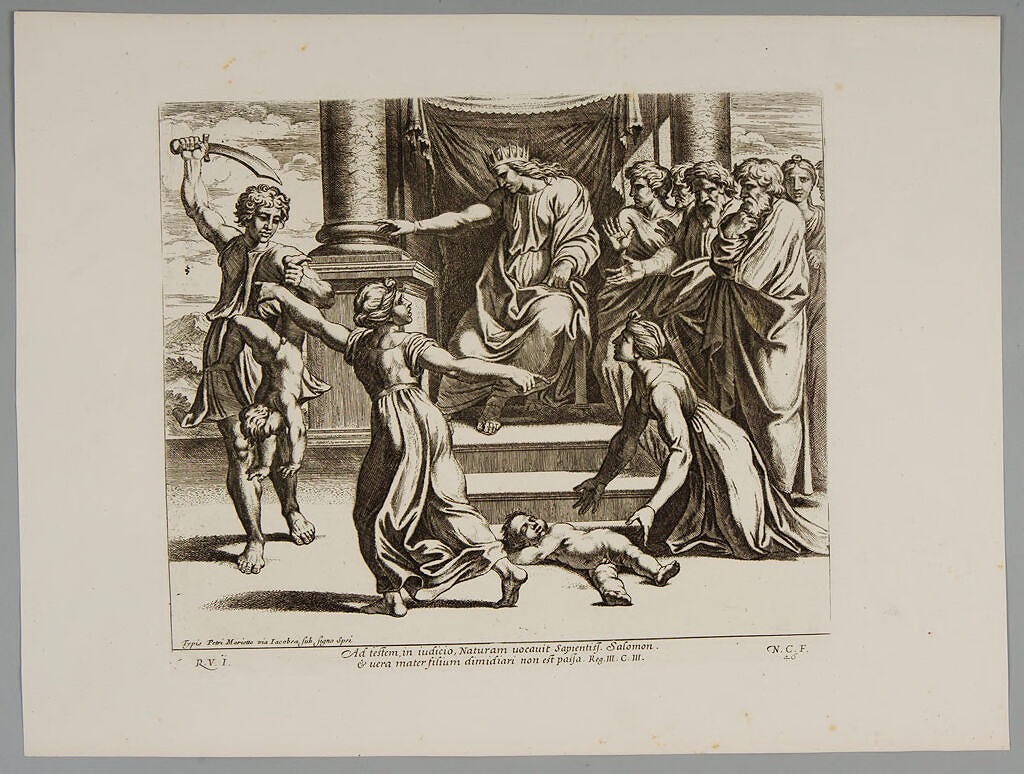
Nicolas Chapron: Judgment of Solomon (17th century)
"Let he who is without indecency cast the first criticism."
The Decent seem to have the greatest license to criticize those with fewer scruples. They appear to inhabit unimpeachable high ground that bestows better judgment, so who better to critique others? Does Decency necessarily assign such a responsibility upon its perveyors, or are they somehow enjoined from overly overtly criticizing, lest that seem unseemly? I suspect the answer to these questions must be the responsibility of each Decent person. I know the answer for myself, though my answer sometimes shifts, depending.
I do believe it’s unseemly of me to criticize harshly, or, perhaps, to criticize at all.
Weekly Writing Summary For The Week Ending 12/04/2025

Muirhead Bone: Rainy Day, Deal ((20th century)
This writing week saw the first hard freeze in this Valley They Liked So Well. It also saw the start of its typical seasonal socking-in as this bowl filled with fog that the weakening sun could not manage to burn off. Rudolph the Red-Nosed had a prominent franchise here in my youth, and would today if video games hadn’t undermined most of our traditions. The Villa felt cozy with the fireplace blazing after my granddaughter Tilda struck the fateful match that lit the first pile of kindling and firewood, leaving the fireplace warming through the long post-Thanksgiving weekend. I continued my exploration of Decency in its surprisingly many guises. I suspect that if I focused this much attention on any topic, though, I’d only undermine whatever I thought I understood about it beforehand. Learning settles nothing, but usually opens ever more complicating and confusing cans of worms, ad infinitum.
Ferocency

Hieronymus Wierix: Cruelty (1577)
Gallery Notes:
The female personification of Cruelty (Crudelitas) sits on a bag where the collected grain flows out. She hands a bread with a fish to a dog, and a stone with a snake to a young child. In the tree behind her sits an owl with a burning heart in its beak. On the left in the background a river with a current acceleration. On the right in the background a face on a village. On a field, a woman sprinkles food for the pigs. In the margin, a six-line exlanatory poem in Dutch, Latin and French.
— — —
"Under certain uncertain conditions, a two-by-four to the side of the head could be considered an intervention of Decency."
Varying intensities are permitted when deploying Decency. It needn’t always seem gentle or even necessarily kind. As with most things, tough love equivalents unquestionably exist, though one must usually deploy them circumspectly lest motive be interpreted differently than intended. In business, for instance, certain otherwise unseemly intensities seem permitted under the self-referential rubric that “business is business,” a multi-purpose excuse intended to cover every possible variation. It seems as though nobody can call “violation” regardless of the intensity of the application if it’s done in the pursuit of profits.
I’ve also noticed a certain erosion of what used to pass for decorum, allowing for some rather coarse words to be injected into otherwise benign conversation.
MoralHazards

Unidentified Artist: Danvers, Massachusetts Insane Hospital (c. 1903)
"What does it mean to respond Decently then?"
Decency seems to demand continual adaptation. What constitutes Decency in one context might border on indecency in an adjacent space. Further, emotional states also enter into this calculus. One might easily justify different responses when feeling angry than when feeling secure. Decency does not provide an isolated or isolating platform for responding. Everybody’s inescapably in each fray together, whatever their behavioral or moral preference. It might not prove helpful to equate Decency with morality, especially when subtle senses of superiority creep into the internal conversation. That said, the Decent might behave more consistently, if only because they insist upon certain limits and boundaries. There are probably many more things Decency won’t consent to do than indecency even notices.
I’m fussing today about how Decency can get twisted in the presence of the insane.
InnerIndecency
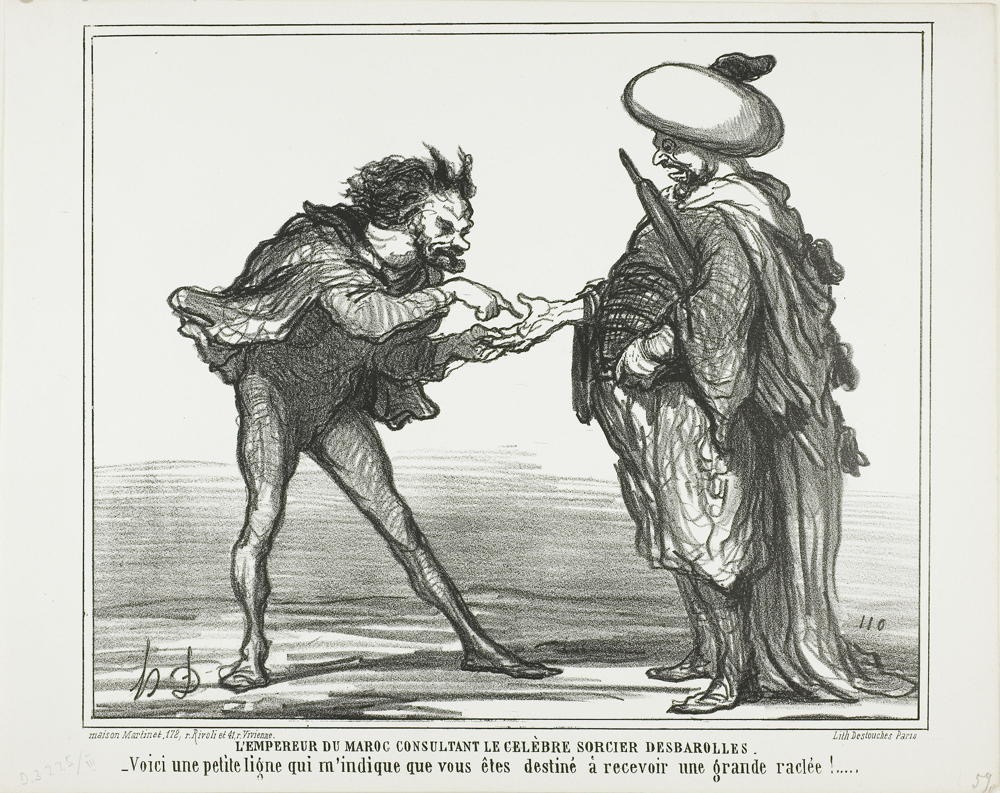
Honoré Victorin Daumier: The Emperor of Morocco in Consultation With the Famous Magician Desbarolles. “- This small line here indicates to me that you are going to get a royal thrashing!,” plate 126 from Actualités (1859)
"They ultimately only manage to fool themselves."
Some things I firmly believe that I can see might not actually exist. Belief provides more than adequate evidence to convince almost anybody that almost any nonexistent entity probably exists. Beliefs can be remarkably incorrigible beasts, so they must be held with a certain circumspection. They might support unshakeable conviction in absolute fiction. I concede that many of the worst indecencies I’ve ever witnessed fed on just such convictions.
Furthermore, few who held those convictions were ever considered to be felons, though the damage they inflicted might well have supported criminal indictment.
SelfDealing
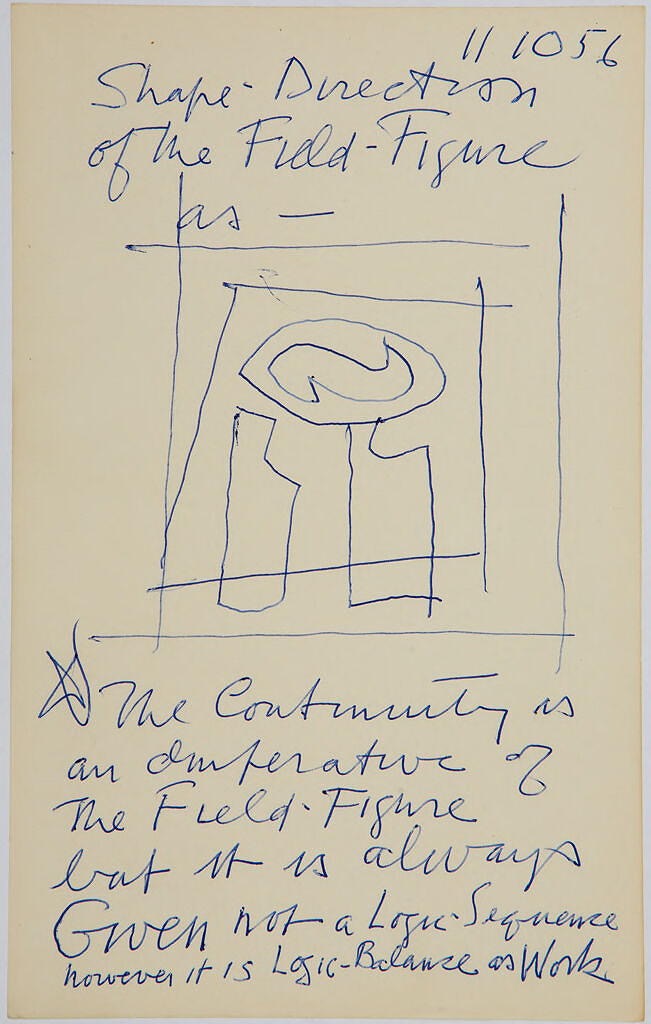
Stuart Davis: Study for “Package Deal” (1956)
"Nobody Decently corners any competition."
Decency requires some hair-splitting. One must somehow manage to sustain oneself without over-reaching. Society maintains laws against monopoly because we deem SelfDealing indecent. It’s unseemly for anybody to merely compete with their own interests. It’s considered Decent to engage as a part of a system rather than as the entirety of it. Monopolists freeze others out, essentially robbing them of opportunity, however much their monopoly might resemble greater efficiency. Efficiency in the service of nobody else amounts to wasted effort. Efficient monopolies are merely rapacious.
Oligarchies are monopolies on steroids.
RelativeDecency

J. Edwards*: Color Relativity (1942-1949)
*Newcomb College Art School Student
"…I will remain confident that I understand what constitutes some relatively absolute Decencies."
Like everything else, Decency exists on a sliding scale. Few absolutes seem appropriate when considering it. One person’s Decency might well prove to be another’s downfall. Further, it often appears in know-it-when-I-see-it guises. I sometimes feel surprised to find that what I thought might degrade me turns out to elevate me instead. Likewise, some actions initiated in good faith and lofty intentions leave me feeling humiliated. Even with my considerable decades of experience, I have yet to develop a foolproof method for classifying Decencies. Yet I continue as if I understood, as if I could know how to tell Decency in action. I’ve many times proven myself fully capable of fooling myself. What could be preventing anyone else from fooling me, too?
I still consider myself firmly on the side of Decent.
D_e_C_ency

Unidentified Artist: Social Settlements: United States.
District of Columbia. Washington.
"Noel House": Noel House, Washington, D.C.:
Library and Reading Room (. 1903)
"Beware the land speculator promising to eliminate non-existent swamps."
Contrary to popularly promoted misconceptions, our nation’s Capitol was never a shithole. It did begin life as a swamp, one owned by that era’s most enthusiastic land speculator and so-called founder of our country, none other than General Geo. Washington, esquire. Those promising to “Drain The Swamp” were centuries too late, for the original swamp had long before been drained and filled to allow a truly great city to be built. The result was not, like most of this world’s capitols, some ancient artifact built on ruins, but a testament to a country’s citizens’ dedication to self-governance. They funded and built an odd collection of buildings, some grand and inspiring, others quite the opposite. The boulevards were broad and laid out so that every few ran diagonally. The result seemed absolutely unique in this as well as every other country. Its heritage was that of a swamp, for sure, but its legacy was self-esteem.
Many have noted that perhaps the primary function of government has always been to “Make Sausage.”
Weekly Writing Summary For The Week Ending 11/27/2025
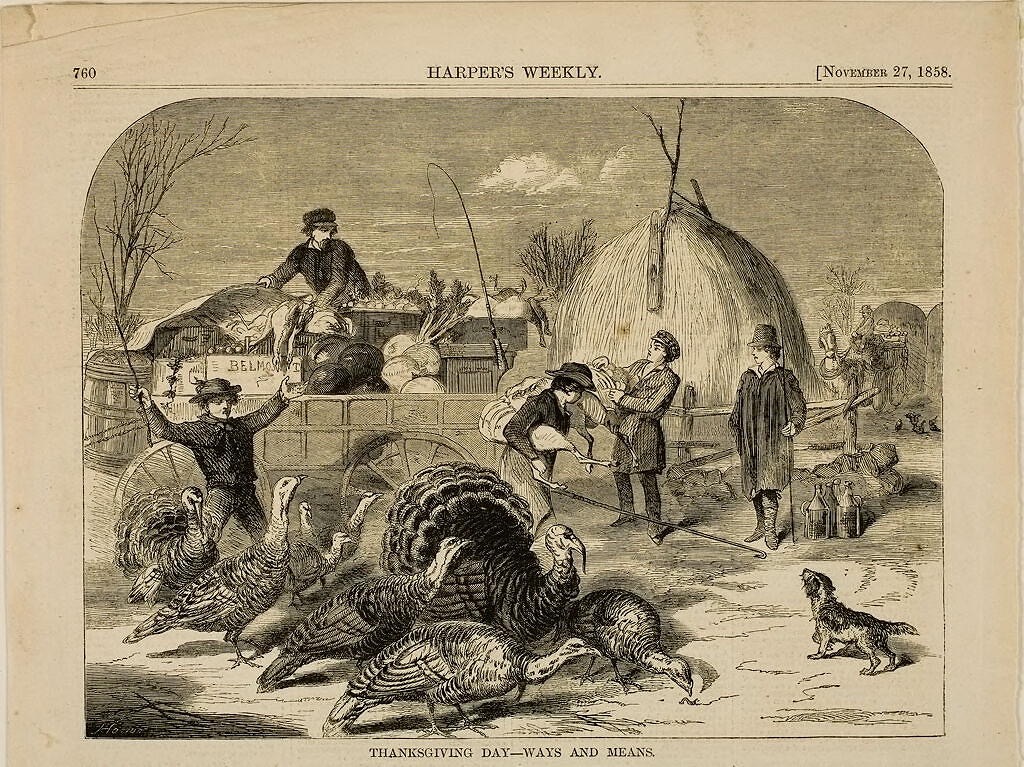
Designed by Winslow Homer: Thanksgiving Day - Ways and Means
Harper's Weekly, November 27, 1858
This writing week, like every previous week, was destined to become a writing week that was. Like you, I live with a trailing tail endlessly emerging, persistently trailing me, and refusing to let go of my present past or my fading presence. I routinely accomplish considerably less than I might otherwise prove capable of producing. Any engine designed with the presumption that it might perform at its design peak was always designed to fail. Any engine built to perform well beneath its design spec was always built to actually exceed its more optimistic expectations. I began this writing week naming a familiar haunt, the Dundency that has always followed me. I praised that most unlikely and always welcomed couple, Dignity and Freedom. I reframed my experience of Decency as a Decendency rather than as an ascendancy up and into any place above. I reported that indecency seems radioactive in Radioactivization (which is a term Google® found no hits for on the internets). I ended this week with a short screed insisting that Decency must be deployed relentlessly if it is to be effectively used. I appreciate all those who shamelessly employ their Decency without ever once necessarily expecting to be rewarded for their efforts. Bless us all as we defend the continuing insults to our Dignity again. Thank you for following along!
Relentless

Félix Edouard Vallotton: Cover for Paris Intense (1894)
"This necessarily requires that the Decent fear less and be Relentless more."
As near as I can determine from here, the universal antidote to indecency must be RelentlessDecency. Nothing more annoys the indecent than Relentlessness being employed in the service of the Decent. I know that we most often associate Relentlessness with more nefarious activities. However, I suppose that Decency probably seems evil enough to the indecent, perhaps among the most heinous possible activities, especially for the Relentlessly indecent. To be Relentless in the service of the good side of any equation demonstrates a reassuring dedication, for even Decency demands some consistency. Nobody much appreciates the merely fair weather Decent. One must, it seems, become requisitely Relentless to be taken very seriously. If I retreat into numbed silence or simply disappear whenever another indecency appears, especially when it seems Relentless itself, I might just as well have never been here. My sporadic contributions to the general well-being might not have gone for naught, but they probably didn’t go half as far as they might have gone had I more diligently held my ground.
Relentless Decency demands some courage from its practitioner, for it won’t always feel safe to honestly display your Decency when immersed in some den of iniquity.
Radioactivization

Barbara Norfleet: High level radioactive waste storage tank: Savannah River Plant (300 square miles): Aiken, SC. 35 million gallons of high level radioactive waste are stored in the deteriorating tanks
Series/Book Title: The Landscape of the Cold War(1988)
Harvard Art Museums/Fogg Museum, Gift of Barbara Norfleet © Barbara Norfleet (2010)
"That's what Decency appears to be here for."
Indecencies seem radioactive to me. They perform like unstable elements, bleeding atoms on their way to becoming something else. They are by their very nature transitory and poisonous. They produce waste that outlives their original purpose. They prove unsuitable for use in anything lasting. We do not build bridges out of radioactive materials for good reasons. We avoid including them in connecting roads, too. They can produce relatively short bursts of extreme energy and, when properly harnessed, longer-lived power. Whatever the use, though, they leave behind messes far exceeding their initially intended usefulness. Their use requires more than usual justification.
I visited my dentist last week and noticed that they no longer draped a reassuringly weighted lead-lined blanket over me when taking pictures of my mouth.
Descending_Into_Decency

Ohara Koson: Descending egrets in snow (1925 - 1936)
Five settling herons between snowflakes; snowy reed at the bottom left.
"That's how Descending Into Decency feels to me."
I instinctively think of Decency as holding an elevated position, slightly higher and left of some center line. When I engage in an act of Decency, though, I feel a sensation more like Descending. I reflectively think of myself as Descending into Decency rather than stepping up into it. This descending should not be mistaken as degrading or any of the other coming-down metaphors. Decency feels like immersive activity, effort that seems to cloak and reassure me, as if I were being carried and cared for, even though I know I’m the one caring for myself in those moments. Decency seems inherently innocent. It expresses an inner innocence regardless of a person’s prior experiences. It can even be an antidote to some experiences, a penance, or a form of forgiveness.
Because Decency’s always a choice, it brings certain limitations.
CommonDecency
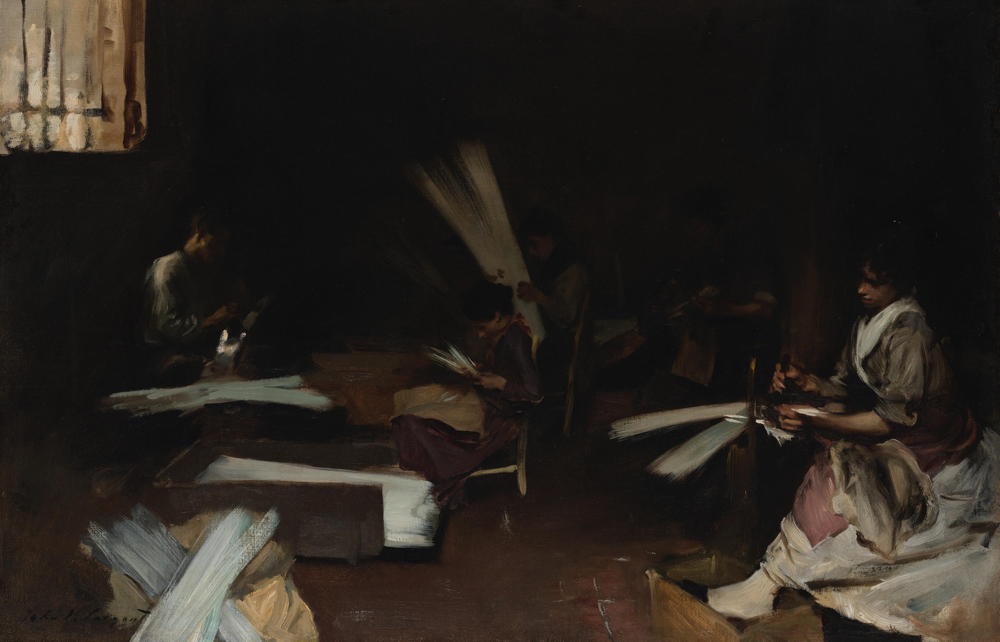
John Singer Sargent: Venetian Glass Workers (1880–82)
ABOUT THIS ARTWORK
Trained in Paris, John Singer Sargent traveled to Spain, the Netherlands, and Italy early in his career in order to study how painters such as Diego Velázquez and Frans Hals captured the effects of light and rendered figures in space. Venetian Glass Workers is one of several genre scenes featuring glass-bead workers that Sargent executed in the early 1880s. This backlit view of a shop in Venice is dark and atmospheric except for the brilliant strokes of light green and silvery white paint that describe the canes of glass as tradespeople prepare to cut them into bead-sized pieces, which will then be polished and strung into jewelry.
— —
"…everything's extraordinary, especially and including CommonDecency."
I once inhabited a now utterly mythical place: The Past. What seemed ordinary and commonplace then, when it was present, seems utterly extraordinary and absolutely unattainable now. I do not mean that some rare and special things are now rarer and even more special, but that even the most pedestrianly commonplace items have now joined the ranks of the exceptional. I can almost experience these once-so-ordinary things vicariously now, through dreams and fading memories, though the colors and textures seem blunted after the passage of so much time.
I have been noticing lately just how remarkable almost everything suddenly seems.
Dignity&Freedom

Paul Giambarba: The Withered Arm (c. 1960)
"May Dignity&Freedom never abandon them…"
Facing invasion by a hostile neighbor, Ukraine declared its purpose for defending its sovereignty. It announced that it was fighting for Dignity&Freedom. Their Freedom demanded a deeper purpose. It could not stand alone as sufficient to justify the suffering inflicted in its defense. Dignity would have to be Freedom’s companion to properly justify the struggle. This combination has lent Decency to Ukraine’s otherwise purely defensive strategies, inspiring freedom-loving nations around the world. Unfortunately, my country tisn’t of this at present. Our incumbent has made it his special mission to discourage our intrepid ally by denying it the necessary and prudent support that any freedom-loving nation deserves.
Now the world observes a different struggle, one between Decency and its enemies, who presently most prominently include Russia and the once United States.
Duncency

Mervin Jules: The Art Lover (1937)
Gallery Notes:
An admirer of 19th-century French artist Honoré Daumier’s social caricatures, Mervin Jules satirizes the myopic gaze of a bourgeois connoisseur scrutinizing a painting. The painting-within-a-painting depicts workers demonstrating against the backdrop of a smoke-filled industrial landscape. The subject memorializes the infamous 1937 Little Steel strike, during which police fired on unarmed unionized steelworkers and their sympathizers protesting low wages and poor working conditions. Jules executed this painting during a formative time when he was studying with Thomas Hart Benton at the Art Students League and employed by the silkscreen unit of the Works Progress Administration.
— — —
"Let such mysteries be."
Not all Decencies contain the same quantity of sincerity. Some seem more phony than actual. Some seem counterfactual. I mention this not to encourage paranoia, for minor discrepancies are probably nothing to lose much sleep over. For one reason or another, or for no discernible reason at all, some will pretend to be acting Decently when they actually aren’t. The motive probably doesn’t matter. The insincerity says much more about them than it ever could about you, and what it says about them will probably remain unspoken, even if you were to break ranks and ask after the disconnect. These acts most often remain uncommentable. You might be able to convince yourself that something smells fishy, but the fish rarely admits to any deliberate deception, or even inadvertent. This often means they’re not aware of their inauthenticity. So be that.
I speak here of that niceness that seems out of context.
Weekly Writing Summary For The Week Ending 11/20/2025

Jean Jacques de Boissieu: Old Man with a Boy Reading (1770)
Our concrete contractor, Pablo, and his crew laid a new sidewalk on the north side of our newly refurbished front porch this week, bringing us one step closer to completing our infinite front porch remodeling project. A new sidewalk serves as the closest thing The Muse and I might ever contribute to permanence here, lasting evidence that someone once lived here, evidence that should last well into the following century. This Writing Week proved to be more speculative than concrete. Change seemed prominent without necessarily feeling imminent. Our hapless administration, still apparently uninterested in administering anything, has been exhibiting some gravely serious difficulties recruiting and retaining EvilPeople in sufficient numbers to completely undermine our Democratic order. I sensed an impending Awakening. The Elites seemed teetering again, on their usual precipice of greatness … or something. I praised our sacred Jurisprudence, which has proven to be the most stalwart defender of our civic Decency. I admitted to feeling Enraged, however politically unacceptable that emotion might seem in a discussion of Decency. I ended this writing week praising the Insubordinate as the true patriot of Decency in our ongoing passion play. Thank you for following along with me here.
Insubordinate

Pierre-Paul Prud’hon: Head of Vengeance (c. 1804)
ABOUT THIS ARTWORK
A study for the figure of Divine Vengeance in Prud’hon’s celebrated paintingJustice and Divine Vengeance Pursuing Crime (1808), the head of Vengeance, who pursues Crime as an agent of Justice, brilliantly reflects the artist’s stated aim for the painting: “to give a commotion to the soul.”
Although the drawing’s blue paper has faded almost completely to gray, the work’s expressive power remains intact.
——
"The Decent direct themselves for their own damned reasons…"
Decency must be an Insubordinate act. It cannot be ordered or productively insisted upon, but must be more or less freely chosen by the individual engaging in it. One may take instruction in its practice, though this offers little beyond a grasp of its underlying concept. Practice proves different in actual practice and utterly depends on context, which shifts so that any two instances might prove the opposite of being indistinguishable from each other. Even experienced practitioners often wonder if what they just tried really represented the Decency they intended. Not even the receiver can always confirm receipt. So much of its delivery depends upon intention, which often necessarily remains implicit. Decency frequently appears in unexpected guises.
Indecencies can easily be coerced.
EnRaged

William Hogarth: The Enraged Musician (November 1741)
"Don't tread on Decency!"
Contrary to popular misconception, the Decent do not naturally lean heavily toward passivity. In some significant ways, Decency can encourage a fury, if only because it tends to sharpen sensibilities. Those incapable of properly parsing experiences, who live a more numbed existence, might find it more challenging to act out when encountering the subtly outrageous. Many infractions fail to piece together their native insensitivity. This can lead to a disturbing passivity. Those, however, more primed to sense disturbing differences might be much more easily encouraged to respond with rage, and even to complain that certain events leave them feeling EnRaged. This fury doesn’t always show, for Decency sometimes, even often, paradoxically, encourages a stifling of certain rages, lest a reaction appear equally outrageous. The resulting ‘anger turned inward’ can spawn periods of dark depression as inner frustration fails to find adequate release in outward expression.
The Decent sometimes foments dissent.
Jurisprudence
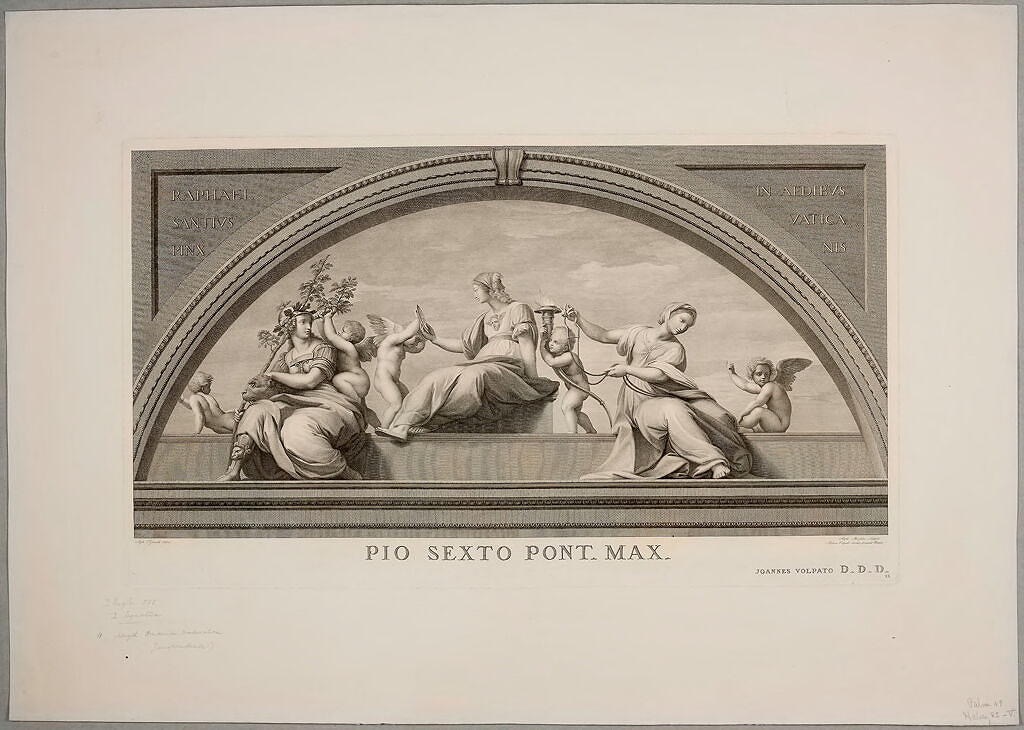
Raphael Morghen: Jurisprudence (18th-19th century)
"Even those who assault our Jurisprudence deserve justice. Decency demands it."
We hold our judicial system sacred, or we have. It has seemed imperiled lately, if only due to the sudden incursion of indecency into her hallowed halls. Our Jurisprudence was the store of our society’s civic Decency, though it has lately seen repeated attempts to degrade it. These have been mainly unsuccessful, if only due to the native ineptness as lawyers of the agents of indecency attempting to intrude. They have filed motions that don’t pass muster and suits that almost always prove frivolous. Our budding Department of Injustice turns out to actually be a department of dunces and indecencies in practice. They seem to believe that they can make anything so by merely declaring it so. However, our Jurisprudence, by which I mean our legal philosophy and long traditions, usually renders that functionally impossible, thank heavens.
Between judges chosen for their partiality and a SCOTUS half dedicated to indecency, our civic Decency has sometimes been taking it in the shorts.
Elites

Eugène Carrière: Elise Smiling (1895)
"…they always seem to disappoint us and themselves in practice."
Some hold a belief in the absolute necessity of maintaining an Elite class in a society. History provides strong evidence against this belief. The story insists that Elites set the standards others follow and sustain society’s highest ground, enabling “regular” people to attend to lesser interests. This notion contradicts the first principle upon which this country was founded: the notion that all people are created equal. The historical record reveals many examples of Elites who, rather than serving their publics, merely served themselves. Crowned heads more often abused their power than wisely deployed it. Of all the awful notions humans have spawned, the notion of the necessity of superiority might have proven to be the worst. Yet, we still worship leaders and imagine them somehow superhumanly capable when, much more often, they’ve proven to possess feet of the most fragile clay.
Our country was founded partly to address the paradoxes that Plutocracy inevitably produces.
Awakening

Henry Duff Linton and Edmond Morin: Awakening (19th century)
"…American Dreams emerge from Awakenings."
The question of when our incumbent might start to seriously bleed supporters has been prominent in the minds of his many detractors. For us, and I consider myself a prominent detractor, it was always unthinkable that anyone might even imagine supporting him, for he seemed simply vile. His incoherence alone rendered him unsupportable since nobody has ever successfully parsed even his simplest utterances. Still, he seemed to possess some hypnotizing power, an astonishingly strange attractor, that reliably attracted and retained what he labeled his base. His base seemed at least aptly labeled, for they seemed to follow their leader beyond the depths of conventional political depravity. This devotion was truly disgusting to me. He’d famously insisted that he could stand in the middle of Fifth Avenue in New York City and shoot somebody and nobody would raise an eyebrow.
That “Teflon Don” capability seems to have started weakening lately.
EvilPeople

William Sharp: Evil (18th century)
"…never in sufficient numbers to succeed, thank heavens."
A promising dispatch from the front lines of The War On Decency reports an apparent sharp decline in the ready availability of additional EvilPeople to populate the ranks of the administration uninterested in administering anything’s many anti-Decency programs. Reports indicate that hiring and performance bonuses have proven inadequate to attract sufficient numbers of eager candidates. Further, a reassuring swell in voluntary resignations has only added to MAGA’s staffing problems. It seems that officials grossly overestimated the number of Americans who would voluntarily stand against their fellow citizens. This shortage was reportedly the deciding factor behind our incumbent ordering National Guard troops to be mobilized into our cities. Adequate numbers of volunteers refused the assignment. Now, though, with courts refusing to permit our incumbent from deploying the National Guard against citizens, the whole movement seems increasingly imperiled.
Their naive belief that we would not prove to be Decent people under pressure has apparently bitten them in their collective ass.
Weekly Writing Summary For The Week Ending 11/13/2025

Hendrik Post: Title vignette of "the quack" (1718 - 1751)
Vignette with a group of actors inside an ornamental frame with musical instruments and masks and two monkeys with zots hoods, holding books and documents with stamps. The title of the farce is on a wall under the stage.
This writing week proved to be a genuine discovery. As usual, I set off on this adventure not understanding the purpose of the excursion. I consider this factor to be de rigeuor. If I planned beforehand or (shudder) outlined the trip before I took it, I sense that I might have leached most of the eventual potential out of it. I entered naked and, right off the bat, I hit at least a double into the corner with ThanksTaking. In this venial season of political degradation, it made perfect sense (and I make no overstatement suggesting this) to downgrade the usual, familiar Thanksgiving celebration to the level of the typical druid appreciation: roasted gruel with a side of sour cide, instead of the usual turkey with trimmings. I then entered into a short series of side-explorations, considering the relationships between Decency and Disgrace, Disgust, and Misdirection. I then slipped into a half-remarkable question: What might be the MotiveToDecency, given that it offers no clear evolutionary superiority? I ended this writing week admitting that I've been increasingly resembling one of my old nemeses, whom I had always considered somehow beneath me: the venerable and disturingly similar to me, the ever-Decent Mr. Magoo! Thank you for following along on these voyages of discovery!
MrMagoo
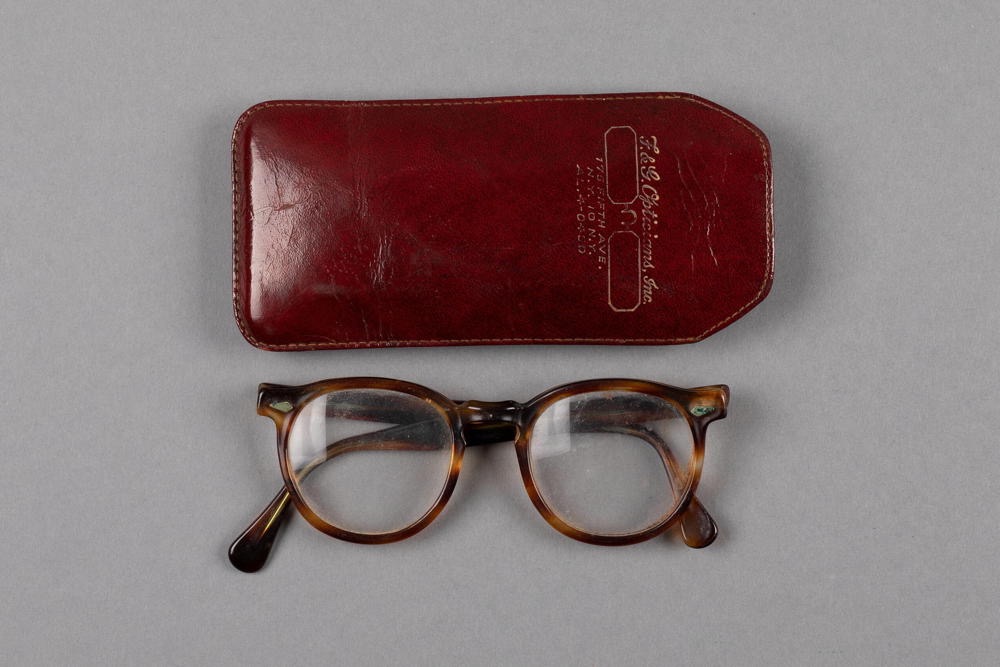
Eyeglasses, in case, Archival Material (20th century)
Collection of Barnett and Annalee Newman
"Wisdom comes from noticing the ridiculed other is us.
Acknowledging this preserves Decency."
MaGoo was a Decent man by most accounts. He was never accused of intending cruelty. Quite the opposite, he was, by all accounts, an innocent, guilty of perhaps, at worst, naivety, at best, a tenacious ignorance. He never knew what he didn’t suspect, and he apparently never suspected anything nefarious about anybody, including himself. His sole sin, if, indeed, this could be counted as a sin, was his steadfast refusal to wear glasses. Being extremely near-sighted, this insistence produced hilarious results as he continually misidentified virtually everything he encountered. He could have easily qualified as The Man Who Mistook His Wife For A Hat, had he been married. He was not ‘touched in the head,’ as was often said in his day, but tenaciously ignorant of the world he inhabited. Because he never knew better, he never suffered. He continually encountered life-threatening situations without once suffering any adverse consequences. It was as if he carried a guardian angel on his shoulders, or one carried him on hers.
In my youth, I watched MaGoo’s antics as portrayed on a cartoon series.
MotiveToDecency

William Merritt Chase: Alice (1892)
"It's me, mustering my own Decency for its own sake. That's plenty."
It doesn’t seem fair that Decency doesn’t bestow special privileges on those who practice it. The Decent get sick and die at pretty much the same rate as the indecent do, so Decency might not provide any evolutionary advantage. Likewise, we see Decent people being taken advantage of, despite their good records. Decency also seems like a difficulty when compared to its alternatives. Just appearing upstanding can prove exhausting, and maintaining a Decent reputation can sometimes seem life-threatening. Those who cut corners without remorse might seem to inhabit the most advantageous universe. Someone else absorbs their overhead costs while Decency spends extra resources dotting their ‘t’s and crossing their ‘i’s. Why?
The MotiveToDecency mystifies me.
MisDirection

Jean Daullé: The Magic Lantern (1757)
"Why, then, does Decency so often prevail?"
Contrary to popular misconception, Decency is not necessarily in a competition with indecency. They might both exist on some imaginary continuum, but that line bisects dimensions as well as linear space. It’s more diagonal than level, and not necessarily a straight or narrow line connecting the two poles, which cannot be adequately characterized as opposites without ignoring some rather obvious similarities. One continuing challenge stems from the straightforward-seeming notion of good and bad, beneficial and evil. Decency isn’t necessarily without sin, and indecency doesn’t always qualify as even a venial sin. Decency might satisfy convention while offending with pretension. Indecency might occasionally be absolutely necessary. Let he without indecency cast the first stone.
Indecency might seem to lack the discipline necessary to fully abide by the rules.
Disgust
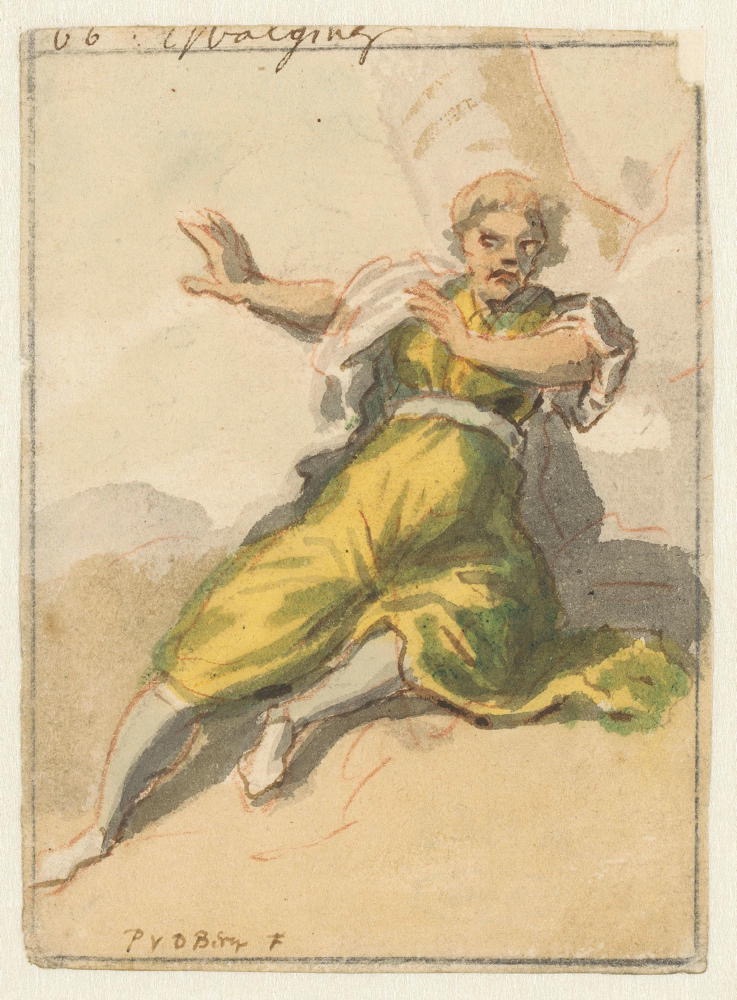
Pieter van den Berge: Disgust (1675 to 1737)
A man, and face, sitting on the ground, his legs and arms rejecting to the left.
"We bring the conversation around to less upsetting topics before the dessert course gets served to aid digestion."
I feel odd mentioning this, but I’ve been noticing Disgust being expressed whenever Decent people gather these days. I’d never before closely associated Disgust and Decency, but upon deeper reflection, I suppose it makes sense that they might commonly appear together. You see, the Decent possess a palate capable of sensing the sorts of dysfunction capable of producing Disgust. Some seem to be able to engage in most any lowlife activity without turning their stomach, while others find revolting displays entertaining. Those who find cage fighting diverting, for example, probably aren’t the same ones who attend symphony concerts. I understand that the standards by which audiences judge performances have changed over the generations; nobody gives a second’s thought these days to watching a bloody murder mystery over dinner.
Some core discerning Decencies remain.
Disgrace

Anonymous Italian, Venetian: Book IX.5.
Roman consuls are sent under the yoke of Samnites
and are exposed to disgrace {Primae Decadis Liber Nonus p. LXXV}
Series/Book Title: Illustrations from Livy, Decades. Venice, Philipp Pincio, September 27, 1511
(1493)
"Wherever Decency seems endangered, some Disgrace is being denied."
Indecency seems to be somehow related to Disgrace, though I’m uncertain which serves as the chicken and which as the egg. Does indecency follow Disgrace, or does Disgrace trail indecency? I sense that Decency does not know Disgrace intimately, if at all, and that Disgrace often accompanies a fall, again, as either cause or effect, perhaps either. What does it matter? I’m toying with a proposal that indecency often accompanies Disgrace and seems to be frequently employed to attempt to cloak its presence. A fear of Disgrace might frequently justify indecent behavior, such that where indecency thrives, Disgrace appears to be hiding nearby. In this sense, indecency serves as a tell that some potentially embarrassing truth might be lurking. What might seem like run-of-the-mill cruelty, for instance, might distract from some deeper depravity.
Certainly, where indecency seems to thrive, depravity seems to follow right behind, or perhaps it leads.
ThanksTaking

Jacques Callot: Avarice -
Series/Book Title: Seven Deadly Sins (17th century)
"Our fathers grant to thee, expanding liberty, of this we sing. Land where our father's tried to live genuinely Decent lives, protect us by thy light, let freedom ring!"
Continuing their War on Decency, the administration, utterly uninterested in administering anything, continued eroding our foundational liberties by severely wounding one of our most treasured traditions: Thanksgiving, and defiling it by denying food assistance to the most vulnerable thirteen percent of our citizens, thereby eroding the sense of plenty usually accompanying the harvest season, replacing it with a deepening sense of dread. Further, the Federal machinery began dismantling our air traffic control system by withholding air traffic controller paychecks, prompting them to call in sick in record numbers, resulting in a spate of near misses, clear signs of an overloaded system. The administration began shutting down pieces of that system, cancelling service, thereby threatening the usual migrations homeward common to this season. Thanksgiving has this year been subsumed by a deepening sense of ThanksTaking.
Who thought it possible that anyone or anything could deeply wound our native optimism?
Weekly Writing Summary For The Week Ending 11/06/2025

J. H. W. Tischbein: Three Beavers Building a Dam (c. 1800)
ABOUT THIS ARTWORK
Johann Heinrich Wilhelm Tischbein experimented with animal physiognomy in many drawings. Inspired by the Swiss philosopher Johann Kaspar Lavater, the artist believed a person’s character depended on the animal he resembled. As Tischbein wrote in 1796, “I have undertaken another [series of drawings] in order to learn more about man. To make this study easier it is necessary to begin with beasts, since they are easier and their characters more evident.” Traditionally busy animals, these furry beavers exhibit human expressions as they focus diligently on the difficult task of stemming an exuberant waterfall.
This writing week brought an end to Daylight Saving Time, ushering in my overlong season of early darkness and gratefully earlier sunrises. I was going to be up anyway, so I appreciate early daylight almost as much as I revile early dusk. This writing week also marked the end of the overlong baseball season, a national pastime that consumed more than its fair share of my time toward the end of the Series. Halloween visited, christening our refurbished porch with treat-seekers and kid footprints. I celebrated with Treating. I explored the metaphor of Decency as Dust. I found it surprisingly satisfying before delving into barking Madness, not as metaphor but as practice, as presently practiced by our increasingly hapless incumbent. I explored the proliferation of what I labeled ‘UmUrgencies,’ ineptness-caused emergencies invariably responded to ineptly, too. I found some solace in writing about Derision’s generally impotent attempts to discourage Decency. Then I ended this writing week by reminding myself and my readers that Decency almost exclusively comes in remarkably small packages. Thank you for following along here!
SmallDecencies
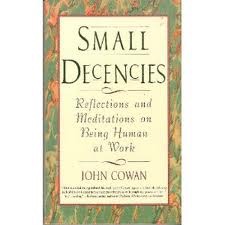
M.E. Edwards: Full of worries (1892 - 1905)
Gallery Text: Sheet with 6 representations of different kinds, including representations of a man who finds a sick boy on the street, a traveler who eats his bread and a man who makes wooden dolls. Between the images, verses in book print.
"Decency seems to reliably visit only those not desperately searching for it."
It might be way past time that I clear up one possible misunderstanding: Decencies almost exclusively come in very small packaging. I’m not denigrating grand gestures, for those most certainly have their place. Nor do I badmouth the occasional excesses which add that certain celebratory spirit to life. The grandiose and even the gross definitely have their places, but neither proves necessary nor sufficient to induce the genuinely Decent. Decency almost exclusively appears in tiny sizes, and even when it seems to appear in one of the larger ones, it tends to be some attribute of the thing that carries the Decency within it. The balance usually turns out to be packaging.
The often disappointing attempt to produce grand changes tends to be entirely overshadowed by the tiny, thoughtful gift —the kindergarten artwork, rather than the Hope diamond.
Derision
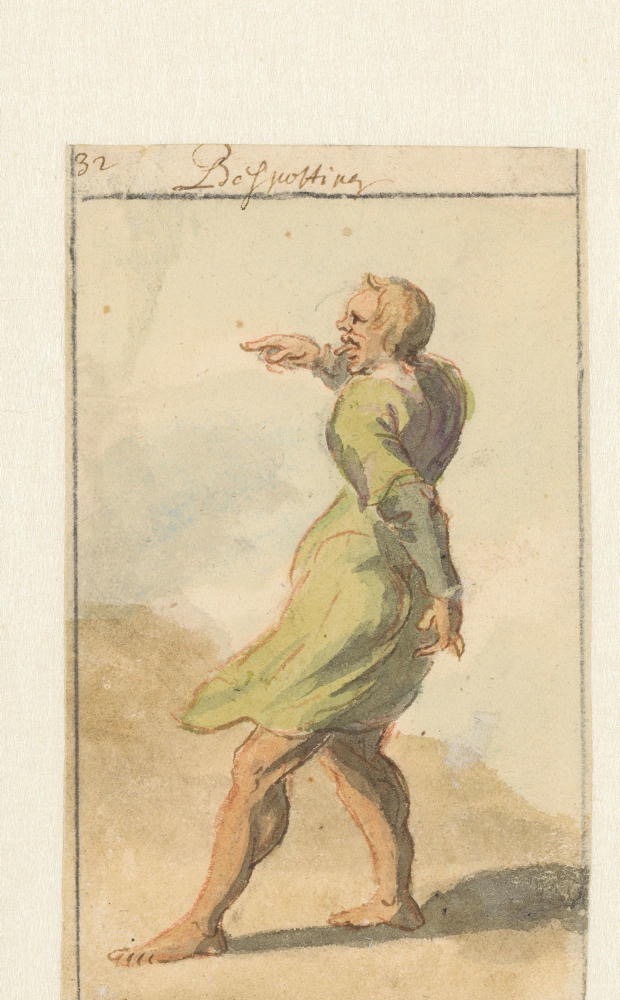
Pieter van den Berge: Spotting (1675 to 1737)
A standing man with his tongue stuck out and his right hand pointed raised.
"…indecency exhausts itself with its own irrelevance."
Few compliments seem less complementary than Derision, but it tends to be the praise of choice when passed from the indecent toward the Decent. The indecent hold limited resources, certainly less vast than Decency ever commands, so they compensate by making loud noises and dramatic gestures that signify little and mean even less. In any odd moment, their advantage, if only represented in volume, might appear to be overwhelming. They do the lizard dance where they stand tall on their skinny hind legs to appear much larger and more powerful than they actually are, relying upon startle reflex to balance what they not mistakenly understand to be uneven scales. Decency learns not to take those threats too terribly seriously, however otherwise terrible they might seem.
Decency learns this lesson in the oldest of the old-fashioned ways.
UmUrgency

Edward S. Curtis:
Hamatsa Emerging from the Woods - Koskimo
(c. 1914)
“Nobody ever better deserved one of those handbaskets they say we should order.”
Never a day slips by or an afternoon recedes without another crocodile emergency appearing. The indecent house of cards our incumbent and his regrettable cabinet have constructed continually threatens to crumble. They have 911, or its equivalent, on speed dial. It’s always the same pattern: someone tried, or usually actually managed to hoodwink them into believing, but it turns out they were misled. Another hasty response was absolutely necessary lest some situation threaten to get resolved. Each intervention only serves to deepen each dilemma until the administration, which never had any intention of administering anything, feels forced to administer something. Their disinterest seems most manifest then, for their proffered solution always makes the situation worse, often much worse. Then they declare another unqualified success, by which I mean another action in no way qualified to be classified as successful. Then, action properly defended to their own satisfaction if no others, they return to parade rest until another inevitable UmUrgency interrupts their distraction again.
The rhythm of these disruptions has become perfectly predictable.
Madness

James Naumburg Rosenberg:
Mad House (20th century)
"May Decency preserve us until this Madness crumbles."
Occasionally, in the course of human affairs, sanity becomes an impossibility, so Madness takes over for a spell. These periods tend to be brief in the scale of any country’s history, but memorable in terms of lessons learned, or, if not necessarily learned, then lessons experienced. These lessons become uniquely memorable, in part, because they produce devastating results: stock market crashes, wars, famines, and the occasional pestilence and plague. It’s almost as if success became unbearable, so voters opted to try failure for a while. Their world shortly thereafter goes to Hell. That they brought it on themselves complicates responding in any otherwise reasonable fashion, so squabbling consumes what might have been a crisp reply. Countries do tend to eventually achieve recovery, albeit a chastened one. Then comes the painful period where they try to learn something from their experience. Much blame changes hands, and eventually, what will pass for a fresh sanity takes over.
During the period of degradation, Decency becomes a stranger.
Dust

Willem van Konijnenburg:
The re-voting in Groningen (1897-06-27)
"Ditto and more so with Decency."
Think of Decency as Dust, as a sometime annoyance and occasional inconvenience. In this country, Dust is ubiquitous, present regardless of cleanliness habits. It’s probably never not there, but its presence isn’t usually prominent. It’s most appreciated in its absence, for the necessities accompanying its presence tend to inconvenience. It shocks when it finally comes into focus, almost always unexpected. Annually, the knick-knacks get attended to, and a deep sense of significance and gratitude always gets left behind. The Dust was never as rare as was the shocking awareness that it had always been there.
Decency seems the opposite of Dust, that reviled presence that tends to sneak up on us. Decency seems clean by comparison, but think of indecency as mud.
Treating

Yamada Hōgyoku: Bat and Moon (1830s)
"Let tradition bring us through those times when we feel most threatened."
I take refuge in traditional rituals when Decency wears thin. I had forgotten how important Halloween has always been until that first goblin rang the doorbell to threaten me with tricks if I didn’t deliver a treat. The current crop of kids passed muster, mysteriously dressed as current characters. I have to ask what each one ‘is,’ because I don’t get those memos anymore. I wore a vintage Felix the Cat costume in my time, though I doubt any of this year’s crop of costume wearers ever knew to remember who Felix was. One came bare-chested in the chill. One wore an inflatable T-Rex suit that probably snagged on the rose bushes that line our front walk. Many forgot to declare, “Trick or Treat,” and needed to be reminded to fulfill their part of the performance. I felt like I inhabited a Norman Rockwell painting or a vintage Walt Disney movie, experiences I had been in sore need of believing in again.
Kids these days don’t much go in for tricking, certainly not on the scale kids did in my grandfather’s youth.
Weekly Writing Summary For The Week Ending 10/30/2025

Adolph Menzel: The End (19th century)
This Writing Week almost exhausted October. This author found his stories to be successfully Reassuring thanks to the old and always reliable DoingSomethingDifferent. I found myself writing what, in retrospect, seems like a series of introductions to Decency, as if I needed reminding of its nature and appearance. I noted that Decency tends to be eminently Self-Interested but not self-obsessed. It surprisingly shuns Moral Highground if only because that often violates Decency's first principle, which insists that we're all created equal. I decided that I have been submitting Dispatches from the Front Lines of the War on Decency. I ended this writing week with a different introduction, this one to Decency's Edges, which are many, varied, and not always entirely as expected. Thank you for following along!
Edges

John La Farge: The Dawn (1899)
Gallery Text: The Dawn is based on a preparatory drawing (also in Harvard’s collection) for the decoration of the New York City residence of Cornelius Vanderbilt II. Although that composition was abandoned, it must have captivated the artist, for he returned to it almost twenty years later in this painting. Indebted to the work’s initial conception as a mural, the arching, elongated figure of Dawn has a bold, linear quality that can be easily read from across a room, while the creamy peach, purple, and turquoise tonalities are decorative without being overpowering. La Farge’s interest in light effects and color harmonies had already inspired his invention of opalescent — also known as “American” — stained glass, which the artist used in numerous commissions, including the translation of The Dawn into a window for the Brooklyn residence of philanthropist Frank Lusk Babbott in 1903.
"Decency can be a reliable partner but makes a lousy co-conspirator."
Decency can be an unreliable co-conspirator because he just won’t do some things. When co-conspiring, things tend to work best if the conspirators can maintain as much latitude for action as humanly possible, and Decency can be relied upon to feel squeamish at inconvenient times. Indecency cares little for propriety and easily oversteps boundaries. It can inadvertently wander into ethically dangerous territory in the passion of some pursuit, while Decency will more likely notice when he loses his moral compass heading. Even when a rule’s unjust, Decency’s less likely to try to bust through it, and will more probably find some way to discreetly weasel their way around it instead. All that said, Decency will not agree to do just anything. Decency maintains high standards.
Decency believes it matters how the game gets played.
Dispatch
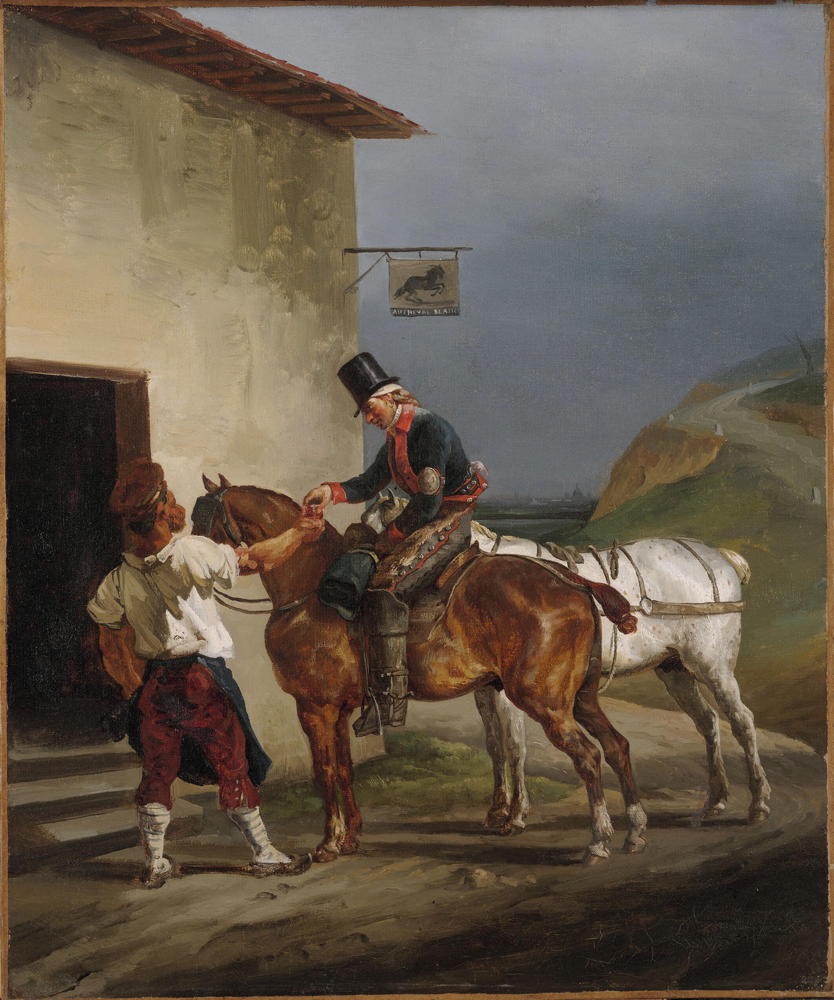
Théodore Géricault: The White Horse Tavern (1821-1822)
Gallery Text: Discouraged by what he believed to be the conservative tastes of the French art establishment, Géricault traveled to England and exhibited his work in London in 1820–21. Received with critical acclaim, he engaged with the local manner, which included an embrace of naturalistic compositions and a more muted palette. Here he depicts a weary uniformed postman receiving a drink from a waiter outside a roadside inn. He focuses attention on the horses, contrasting their detailed muscular frames with the summarily rendered figures and landscape. The inn’s sign, which translates as “White Horse” even though a black one is illustrated, locates the scene in France, possibly outside Paris, explicitly alluding to Géricault’s mingling of British painting conventions and a French context.
"How long before we become the bastion of Decency again?"
These Decency Stories have been serving as Dispatches from what passes as my front line on The War on Decency, which began long before our incumbent’s current term, though he has been a chief, if not exclusive, aggressor. A Dispatch amounts to a letter intended to inform its receiver of the conditions the dispatcher—the letter writer—experiences in the receiver’s absence, often sent from the front line of some conflict. It never even pretends to be a comprehensive report, for no position on any front line provides adequate perspective for any observer, however otherwise objective, to fully experience any conflict. A Dispatch must necessarily represent only a narrow, local view of what usually proves to be a much broader engagement. I have created my Dispatches in the belief that my local view might not materially misrepresent broader perspectives and might instead reflect a more universal experience.
That said, I believe the front lines of any conflict necessarily reside in the chests of the combatants.
MoralHighground
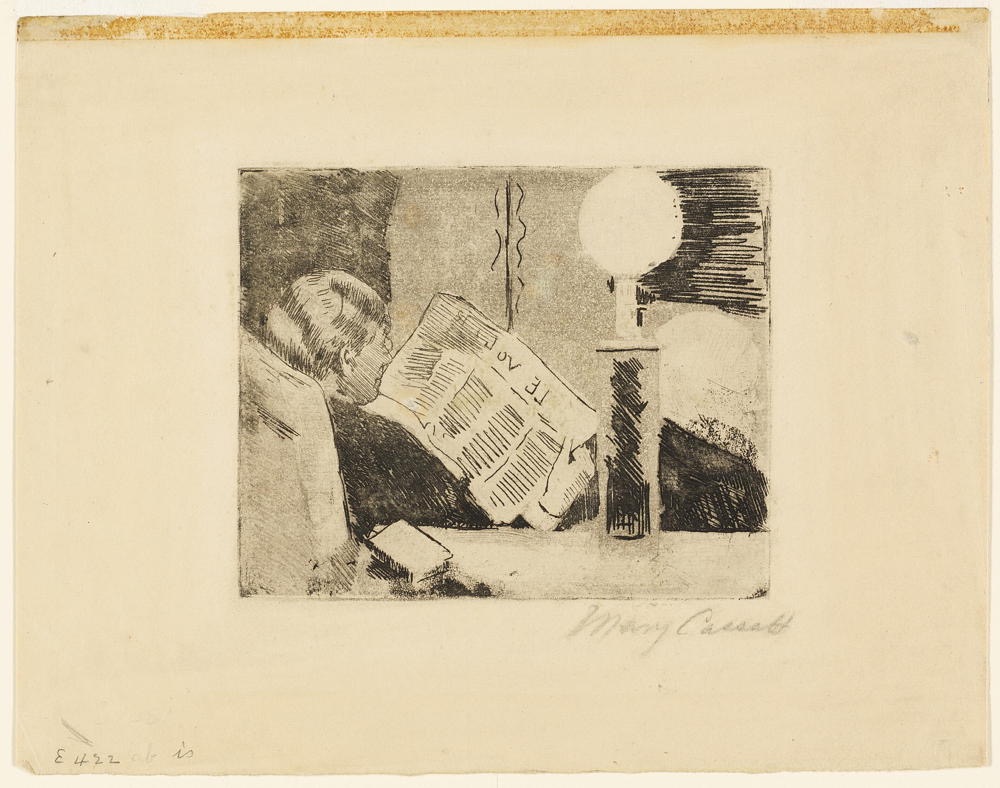
Mary Cassatt: Reading the Newspaper, No.2 (c. 1883)
"…Decency itself falls far beneath us."
Few behaviors disgust me more than sacrosanctity, that self-important quality affected by those insisting that they’re our betters. It doesn’t matter to me upon which basis this flaw manifests; each seems adequately disgusting, but at the peak, for me, stand those who deign to claim sole possession of some certain Moral Highground. Whether priest or heretic, the arrogance off-puts. It seems to negate whatever favorable inference their morality might otherwise make. Those who feel the need to advertise their goodness seem fundamentally dishonest. Decency suggests that good character needs no promotion and might only thrive in more humble circumstances. To promote it is to undermine it.
I hold the so-called “religious right” in particular contempt, for their brand of righteousness seems to rely upon them standing on some people’s necks.
Self-Interested

Berthe Morisot: Self-Portrait (c. 1885)
"…its purpose lies in its reach more than in its actual grasp."
Decency appears to be tenaciously self-interested. Not self-centered or self-obsessed, but definitely and, occasionally, defiantly Self-Interested.
Decency considers self-sacrifice to be at best a minor obscenity, if, occasionally, an absolute necessity.
DoingSomethingDifferent
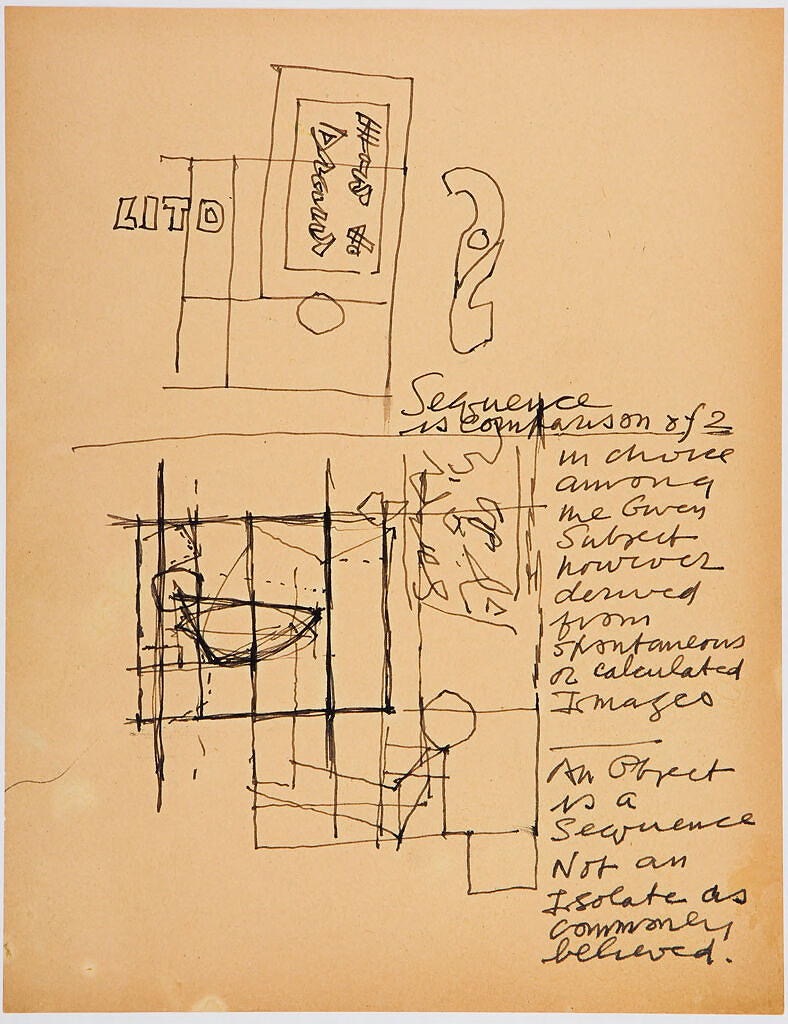
Stuart Davis: Study for “Something on the 8 Ball” (1953)
"…I'll get to rediscover, for the umpteenth time, this self-same tactic for creating lasting change…"
When my inquiry into Decency began to dissatisfy me, I instinctively knew just what to do. That this was precisely what I always do when following my instincts reliably failed to inform me that this strategy had never once worked for long. Oh, it worked well enough in the moment. I shoved myself through to whatever stood in for the other side of that particular difficulty, like always, though it failed to address any underlying issues. Heck, it failed to acknowledge that any underlying issues might even be present. It took it on face value that the difficulty was probably no more than face deep and reacted as if it was just a flesh wound, a superficial complaint.
How did I respond?
Reassuring
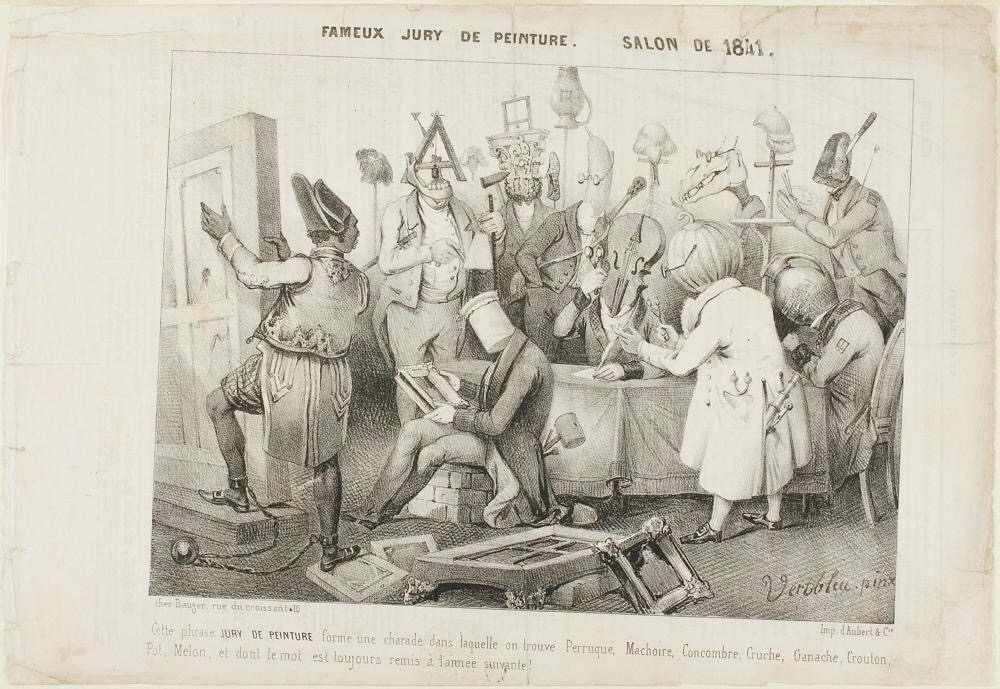
Clément Pruche: Fameux Jury de Peinture. Salon de 1841
[Famous Jury of Painting. Salon of 1841] (1840, reissued 1841)
"…as if recovering innocence might prove Reassuring."
I am not a bottomless font of positive energy. I am not an infinite anything, but a painfully finite being, present without obvious purpose, faking it as best I can. I identify as a man, though I do not align with many of the expectations that come with that designation. I am not very mechanical, for instance, and never cared much for motor vehicles. I am presently engaged in analysing Decency in concept and practice, though my interest in the subject has recently been flagging. As with any search, I wonder how I might tell if I’m succeeding before I’ve finished. In the middle of anything, progress might not seem all that evident. Even at the end, the seeker might be left wondering. Searching seems no different from any occupation, except for the presumption of it ending, of reaching some conclusion.
Considering Decency has increased my sensitivity to both its presence and its absence.
Weekly Writing Summary For The Week Ending 10/23/2025
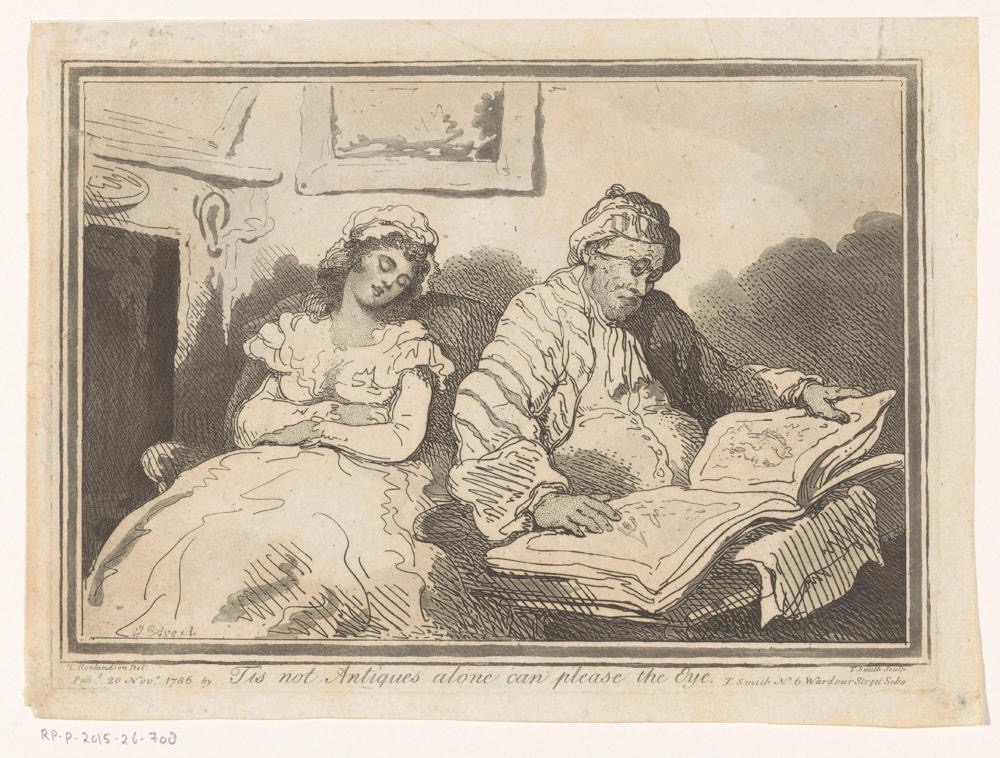
T. Smith: An Old Man Leafing Through a Print Album,
Next to His Young Wife (1786-12)
I doubt that there could be a better allegory of what's happening in this country than the illegal, unpermitted destruction of the whole East Wing of our White House to construct a wholly unnecessary trailer trashy gilded ballroom for billionaires to gather in and gloat. While, by the end of this month, 4/5th of the people receiving food assistance in this county will lose it due to Repuglican indifference. Every damned thing this administration uninterested in administering anything attempts goes sideways and screams indecency. I experienced an emotional low point in the absurdity this writing week, wanting to turn off the endless insults to my patience and intelligence. I've seen stupid before, but never on this scale. I'd heard of indecency before, too, but these clowns recalibrate that scale. too. I feel a little reassured that the pathology predicts that our incumbent's Self-Saboteur Syndrome can't rest until it utterly destroys its host. He's aching for the retribution his mommy and daddy couldn't give him, and for the public humiliation that not even three of the more skilled wives could provide.
Despair

Eduardus Jacobus: Despair (after 1698)
"I'm frantically seeking an exit."
I am learning that indecency was never the opposite of Decency. That ignoble association belongs to Despair. Decency represents the difference between hope and Despair, rendering Decency a rough equivalency to hope. Decency provides a context within which hope might thrive. When Decency disappears, Despair rushes in to fill the void, rendering it even emptier than it had ever seemed before. The miscalculation the MAGA crowd made might have been neglecting to factor in what happens after all accustomed hopefulness disappears. It’s not a win if the reward amounts to a vacuous void. It’s not a win if you leave your opponent with nothing left to lose. Then’s when the opponent becomes most dangerous.
Lawlessness induces desperation.
Cheerleading

Jack Gould: Untitled [band and cheerleaders] (1958)
"…I have no particular influence with The Gods…"
I feel as though I have been Cheerleading for Decency’s team since I began this writing series thirty-one mornings ago. The playoffs finished this week, and the World Series begins two nights hence. I have stood steadfastly on the sidelines, rooting for the home teams to win. I have called no plays or engaged in any games I’ve witnessed. I’ve perhaps just made a fool of myself, gesticulating on the sidelines in front of the stands. I’ve not pitched, hit, or scored a single run, nor could I. I have not broken my leg on a questionable 4th-period Hail Mary play. I’m part of the second string contingent on the varsity bus, there for atmosphere rather than substance. I haven’t once forgotten the unwritten rules of engagement here. I’m present to draw attention away from myself and toward the play on the field.
Like any cheerleader, I’m not here to embody anybody’s idea of masterful play.
Origins

Félix Vallotton: La manifestation (1893)
"I might have been fooling myself then."
I might just as well argue about the Origins of chickens and eggs as consider Decency’s Origins. Some say it’s an innate human characteristic, while others say it emerged from religious influence. Some swear it’s at root philosophy while others insist it’s physiology. Nailing down a definition seems dangerous, even though it seems like such a mild sense on the surface. I can get passionate about it, especially about its absence. I seek it and mourn it, and at times, I suppose, I even fear it. I do wonder, though, how one comes to possess it, or does it choose who it possesses? Is it possible to school someone who seems deficient? Do penitentiaries offer Decency courses for those convicted of indecencies? What does the presence or absence of Decency even mean?
Surely the Origins of Decency must be evolutionary.
A DecentNight

Jan Saenredam: Night, or Woman Sleeping by the Fire (1595)
"I will have experienced more than A DecentNight's sleep, I guess, but A DecentNight nonetheless."
After I’d confided that I slept four or five hours each night, my internist asked if I might be interested in enrolling in one of the sleep studies conducted by our local Sleep Center. I wondered why I should agree to that, and he responded that it might allow me to experience A DecentNight’s sleep. I asked what made my solid four or five hours indecent, and he replied that people generally require more than a solid four or five hours to maintain a decent life. He spoke briefly on the insidious effects of sleep apnea. I responded that I exhibited none of the symptoms associated with sleep dysfunction, and even if I did, I would never consent to wearing a vacuum cleaner on my face in bed. I consider my sleep needs evidence of a biodiversity and not some syndrome requiring therapy. My internist has not mentioned the subject since.
The Muse, though, reports that I snorkel and snore, evidence that I might be exhibiting the presence of some dysfunctional sleep disturbance.
Lose
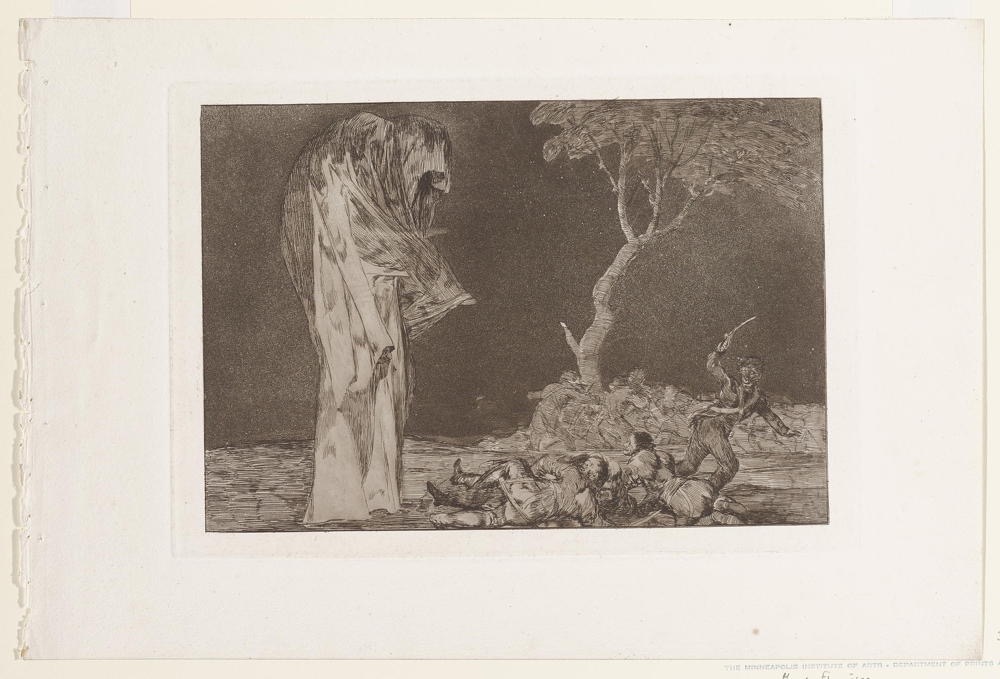
Francisco José de Goya y Lucientes: Por Temor no Pierdas Honor
[Do not lose honour through fear] (1816–19)
"…with ample domain to rule with Decency if I chose."
The Decent possess a superpower the indecent can’t imagine: enough. Indecency might most often emerge due to the presence of some mysterious and overwhelming sense of insufficiency. Everyday temptations can become compulsions under this sense of absence’s malign influence. It might be an illusion either way, the delusions of plenty and scarcity being opposite sides of some self-same coin. Yet the sensation each conviction compels couldn’t be more different. Scarcity, even when (and, perhaps especially when) delusional, easily becomes definitional. Those without enough seem capable of justifying any action with an explanation that it was either necessary or essential rather than merely consequential. Those with plenty, or that innate sense that they possess it, might likewise characterize their actions as necessary or essential, though their effect seems the polar opposite of those ruled by the insidious scarcity mindset.
I’m not suggesting that starving people, for instance, aren’t also capable of Decency, just that those who feel as though they’re suffocating from a sense of want might more easily justify the minor odd indecency, or even justify that lifestyle.
Win

Jean-Baptiste-Siméon Chardin:
The Attributes of the Arts and the Rewards Which Are Accorded Them (1766)
Gallery Notes: This picture may appear to reproduce the casual clutter of an 18th-century tabletop. Not so. Chardin carefully selected objects to convey specific meanings. A palette with brushes, placed atop a paint box, symbolizes the art of painting. Building plans, spread beneath drafting and surveying tools, represent architecture. An ornate bronze pitcher alludes to goldsmithing, and the red portfolio symbolizes drawing. The plaster model of J. B. Pigalle's Mercury, an actual work by a friend of Chardin's, stands for sculpture.
The cross on a ribbon is the Order of Saint Michael, the highest honor an artist could then receive. Pigalle was the first sculptor to win it. So this painting sends multiple messages: it presents emblems of the arts and of artists' glory and honors a specific artist, Pigalle.
A still life (or painting of objects), which is composed from scratch by its creator, can be used to convey complex meanings.
"Decency doesn't rise to the bait that indecency always hides its hook within."
Decency has never been continuously rewarding. It attracts its critics and delivers disappointments. Anyone could complain about “times like these,” for every age has harbored indecent actors who have risen to influential positions, and Decency never seems to hold an overwhelming hand. It goes about its work humbly, primarily for its own sake, if only because it’s its own reward and other approaches seem unthinkable. If popular support doesn’t define Decency’s success, what does? I argue that a different metric determines a Win when considering Decency. In any standard competition, the simple accumulation of acclaim determines a Win. Decency, though, doesn’t quite qualify as a competitive sport. It remains a choice and sometimes seems most effective when administered too sparingly ever to accumulate enough points to win any standard competition.
Those who play Decency competitively diminish it and themselves.
Weekly Writing Summary For The Week Ending 10/16/2025

Max Klinger: The Chronicler (recto) April 5, 1888 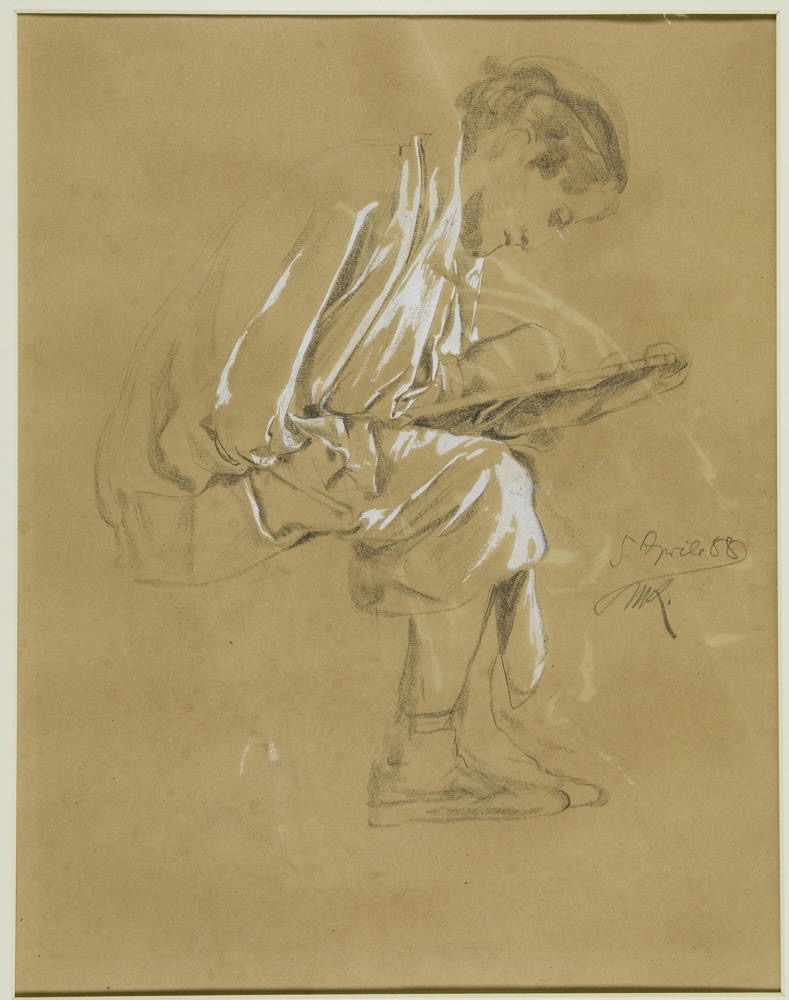
Max Klinger: The Chronicler (verso) April 6, 1888
Gallery Notes: Drawings by the Symbolist artist Max Klinger are very rare. This intimate drawing was completed over April 5-6, 1888, while the artist was staying in Rome on the Via Claudia near the Colisseum. This sensitive figure drawing helped to prepare Klinger’s most important painting of those years, The Crucifixion, 1888/1891. In an almost autobiographical reflection, it depicts the scribe who unemotionally documents the world’s greatest tragedy that rages around him.
This writing week, I focused on themes of Truth, Justice, and The American Way as mediums for describing Decency. I insisted that Truth need not be an absolute to prove helpful in this tenaciously relativistic world. I visited the near-distant future to see our present as precedent in PosseCognito, which was by far my most popular posting in a very long time. I praised dissent in DissEnting, celebrating smart-assedness as perhaps the proudest American tradition. I introduced Questioning into the conversation for it has always been a source of Decency in every discussion. I then introduced a part of me that I don't often own up to possessing: LittleOldMe. I ended this writing week insisting that we're not so much seeking a more perfect union as an ever-more Decent one. Thank you for following along!
MoreDecent

Carel Isaak de Moor: Nar [Fool] (1705 - 1751)
A fool or madman,
looking sideways and holding his elbow with one hand.
"We, The People, seek an ever-MoreDecent Union here."
I, and everyone else in my generation, was raised under a remarkably primitive and repressive regime. We learned to maintain a modicum of Decency despite the pockets of absolute obscenity surrounding us. We discovered potentially useful coping methods that helped us maintain some semblance of sanity when everything around us seemed crazy. It was easy to spot crazy in those days because our fathers and their fathers before them came from even more repressive times, times when whole generations barely survived state-sponsored deprivation. My grandfather was raised in a world where his leaving school after third grade was considered in no way exceptional. He had work to do and a way to find through the world. My father, too, left school to survive. His family needed him to labor more than they needed him to graduate high school.
When I was five, several blocks along West Main Street, the primary thoroughfare through town, was set aside for prostitution.
LittleOldMe

Pieter de Jode (II): Landscape with the Three Graces (1628 - 1670)
The three Graces of Greek mythology were Aglaea, Euphrosyne, and Thalia. Aglaea symbolized splendor and radiance, Euphrosyne represented mirth and joy, and Thalia embodied good cheer and bloom.
"Even LittleOldMe might well be worth it."
It’s one thing for me to treat others Decently and quite another for me to treat myself that way. Even the sparest rules of comportment demand that I treat others Decently, but no such strictures exist defining how I should treat myself—quite the opposite. I expect to sacrifice myself for some imagined betterment of others, as if I weren’t quite worth the effort to respect. And we hold in esteem those who do sacrifice themselves, even when nothing particularly useful or helpful comes of it. And we’re proud of these efforts ourselves. My ego swells when I tell others how I very narrowly avoided serious injury when engaging in some otherwise completely pedestrian activity, or even how I injured myself. It occurs to me that almost nobody really runs marathons to torture themselves. Yet, it seems as though every veteran of them shares harrowing stories of their personal punishments when running their races.
My mother would discount her own presence by referring to herself as “Little Old Me.”
Questioning

Ignaz M. Gaugengigl: A Difficult Question (19th century)
" …We abandon our cross-examinations when we grow weary of discovering…"
Authoritarians despise questions. They try to vilify questioners. They try and usually fail to insult questioners’ intelligence, as if asking were somehow threatening. They understand that there can never be any such thing as not answering a question, for even silence screams its response. Questioning can constitute a potentially healthy back-and-forth, a functional resonance. It’s almost impossible to maintain arrogance in its presence, for it tends to level every playing field. I suppose it’s little wonder why our authoritarians find it so upsetting. It renders it almost impossible to remain seated on any high horse through any barrage of Questioning.
Democracy seems at root a questionable practice, for it leaves many answers unresolved.
DissEnting
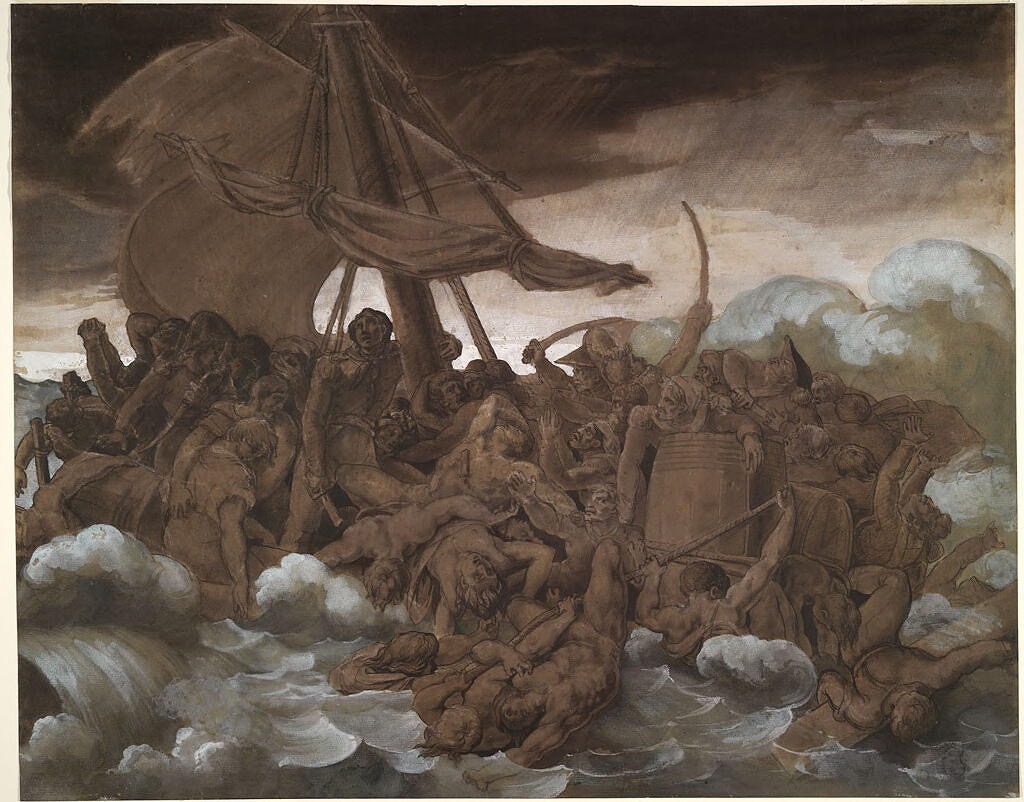
Théodore Géricault: The Mutiny on the Raft of the Medusa
[Historical Background](1818)
"What better way to preserve our actual Constitutional order?"
Portland greets the illegal and insulting invasion of poorly-trained Federal “immigration enforcement” agents with irreverence because that response best represents the American perspective. What better response to an absurdist intrusion than an even more absurdist one? Self-respect demanded some sincere sarcasm. Hell, Decency demanded it. As indecent as I’m sure these acts of silliness seemed to the intruders, any serious response might have been too easily interpreted as a serious one, one to be taken way too seriously, probably with fierce opposition, potentially leading to injuries or deaths. Better to offer them a target difficult to take so seriously, one that might even be ungenerously interpreted as silly. It’s difficult to muster much belligerence from even the most immature Federals when confronting them with people wearing inflatable dinosaur costumes and riding bicycles naked in the rain.
It was not quite civil disobedience but rather dissent, with particular emphasis on the “Diss” part of the description.
PosseCognito

Armando Posse: Procession (1955)
Artist Biography: Armando Posse was a self-taught Cuban artist born in Havana on December 4, 1917, who specialized in engraving, screen printing, and drawing. He co-founded the Taller Experimental de Gráfica in Havana in 1962 and joined the Asociación de Grabadores de Cuba in 1964, where he won an engraving prize. He was known for his graphic production work.
"We, the people, regained the upper hand."
By the mid-2020s, Federal overreach had become intolerable to states and citizens. Routine violations of Constitutional Rights by executive branch-directed agents threatened Decency and civility in targeted municipalities. Among the many particulars:
°The Writ of Habeas Corpus was routinely suspended,
°Masked and armed Federal pseudo police routinely descended upon vulnerable communities
°randomly deploying tear gas in peaceful crowds
°detaining and even arresting and disappearing citizens on mere suspicions or less
°Refusing to identify themselves or their association
°Terrorizing the populace.
To respond, municipalities, counties, and states began passing what became known as PosseCognito Laws.
Truth

William Sharp: Diogenes in Searth of an Honest Man
(18th-19th century)
"Those who in live in opposition to truth end up with what they deserve."
Truth need not be absolute to prove useful. It might be essential that we not get altogether too tangled up in absolutes if we expect to live in this relative universe. Still, the difference between truthiness and falseness seems clear enough under most circumstances. The old Superman aphorism “Truth, Justice, and the American Way” imprinted itself on many in my generation. We came to believe it was downright un-American to deal in untruths and injustice, equating those with our foes’ tactics. In practice, living lies provides faulty foundations, whatever the means employed or the ends pursued. Lies work like phony geometry, for they unreliably characterize level, parallel, and angle. They demand much more maintenance than even the most complicated truths, and ultimately require some form of authoritarian enforcement in order to stand. They cannot ever stand on their own.
Eventually, the castles constructed out of lies must crumble.
Weekly Writing Summary For The Week Ending 10/09/2025

Max Klinger: Simplicius' Writing Lesson (1881)
This writing week watched summer leave, replaced by genuinely chilly mornings and lovely sunny afternoons. Our never-ending porch refurbishment project made definite progress. The carpenters delivered the first of the final components, and our painter, Kurt, and I dutifully prepped them for installation. Most afternoons found me listening to baseball playoff games while engaging in one of the more primal human activities: painting prime coats and sanding the results smooth. I began the week writing about this process in Renewal, which inevitably includes considerable destruction. I noticed myself simultaneously inhabiting two states: Particle and Wave. I ranted a bit about my permanent outsider status in Insider. I began an extended exposition of the War On Decency we seem to be experiencing. I introduced an increasingly familiar stranger in Invisible Enemies Within. I ended this writing week wondering why the presumed most powerful person in the world seems to revel as the continual victim in Hoaxes. Thank you for following along.
Hoaxes
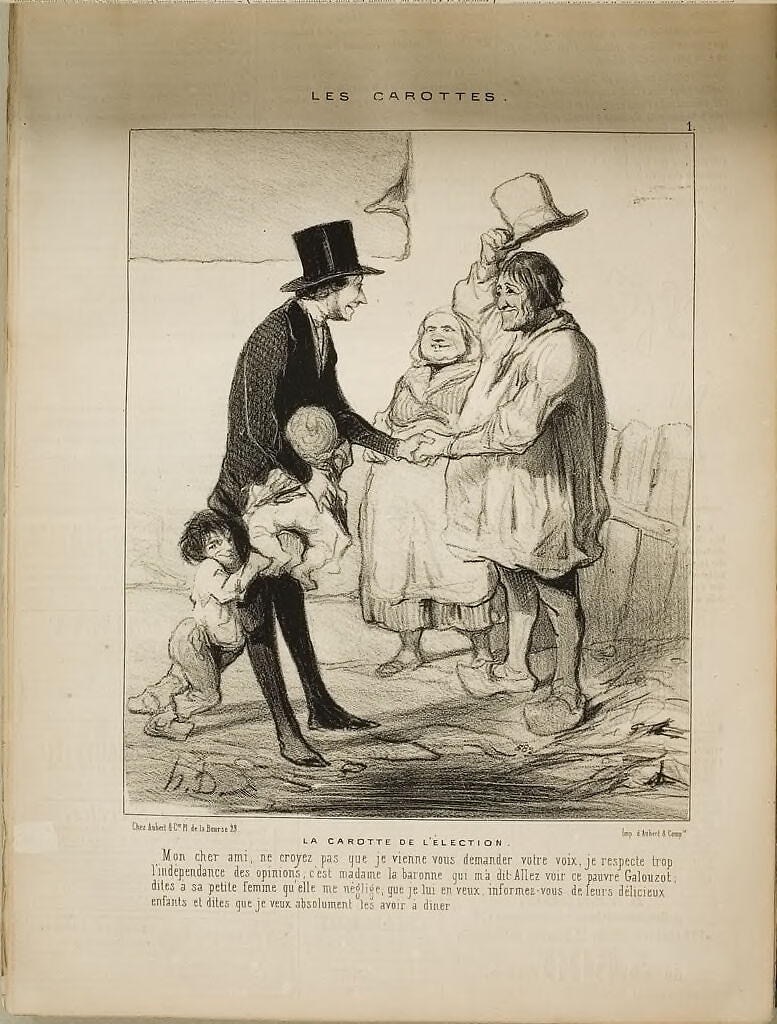
Honoré-Victorin Daumier: The Election Hoax
[La carotte de l'élection] (1844)
A caricature depicting a politician addressing a peasant family. The politician offers a carrot to the family, symbolizing the false promises made to voters.
"How did Decency get so lucky? It was probably the result of Hoaxes."
Decency might occasionally be subjected to some Hoaxes, though most were probably intended as April Fool jokes. I wonder what it means when someone seems continuously bedeviled by Hoaxes, where hardly any situation doesn’t come with a hint or a suggestion of nefarious Hoaxing. In my own short lifetime, I recall encountering fewer than a spare handful of Hoaxes, and none of those seemed in any way malicious. Our incumbent seems immersed lip-deep in a swirling cesspool of them, with some new one appearing almost every news cycle. I wonder what sort of curse might be behind such an infestation, for I swear I’ve never even heard mention of anyone, not even the most tragic Shakespearean character, more beset with such toils and troubles. To listen to the press secretary, her boss must be the most unjustly accused since Moses, and Pharaohs were notoriously intolerant.
It’s one thing to fall victim to Hoaxes, but quite another to publicly proclaim oneself a victim of them.
ImaginaryEnemiesWithin

Adriaen Collaert: The Enemy Sowing Tares Among the Wheat,
from Landscapes with Old and New Testament and Hunting Scenes
(1584)
"..they register every sown confusion as a victory."
When assaulting Decency, it’s probably best to first employ the time-tested EnemyWithin. This one carries the benefit of indicting the victim for harboring the criminal. It easily spreads the sort of madness not easily shaken, for, properly deployed, it gets Decency questioning, Decency’s Achilles’ Heel. Decent people easily accept suggestions that they might have inadvertently offended somebody, for they rarely suffer under the effects of the sin of self-importance. They consider themselves unremarkable, hardly worth fussing over, and open to persuasion if not the slightest suggestion. If they’ve violated some ordinance or custom, they’ll want to rebalance justice’s scales as quickly as possible. This agreeable countenance can sometimes render Decency into its own worst enemy. But I digress.
The EnemyWithin, of course, does not actually exist.
TheWarOnDecency

Robert Ericksen: War-torn (1945)
"Sadly, they largely prove incapable of feeling ashamed."
TheWarOnDecency began with a lessening of standards. Entertainment adopted a coarseness, as if its audience had been struck stupid. Plot and story slowly went to Hell in favor of Soap Operas and, ultimately, something labeled “Reality.” This reality, though, was reality’s archenemy, its theatrical opposite. Intended to titillate, it abandoned formal constructs of entertainment. Audience members were invited to engage in what was labeled as guilty pleasures: coarse language without any clear purpose, cruel lifeboat drill exercises, and endless derision. Some Other or another served as the endless butt of meaningless jokes. Some smartass was elevated to the role of hero, though his character and values remained unshakably shady. Awfulness seemed to be the sole purpose, as if its mere presence signified great success. Spectacle replaced subtlety. Cruelty amplified the underlying purpose. Those who regularly watched truly felt as though they were getting away with something and eventually forgot that they were ever supposed to feel guilty about anything.
What began as drama proved so popular that it migrated into sports, news, and even cartoons.
Insider

Sir Edward Burne-Jones: Perseus and Andromeda,
study for The Doom Fulfilled (1875)
"…probably plead for help from some Insider."
I was always clear that I was not an Insider. I can’t claim to have been deliberately excluded from anything, though it sometimes sure seems as if I must have been. I struggle to get inside. I don’t seem to understand how things work, how they’re classified, or how to gain access. I tried four times yesterday to crack the great mystery of how to order something on Amazon Prime®, only to be thwarted each time. It seemed as if Amazon had forgotten my Pastword, though it arrogantly insisted that I’d forgotten mine. I fool their security, though, by never remembering mine. I have software that remembers PastWords for me, so I can never forget them. Anyway, Amazon proved to be unusable again, as usual. You’d think that if they wanted customers, they would design access to allow even us outsiders inside. They do not.
My toilet seat broke yesterday.
Particle&Wave

Fukushima Ichirō: Wave in Chiba (Shōwa period,1926-1989)
"Perhaps our Decency utterly depends upon such useful fictions."
Decency, like matter, simultaneously exists in two states: Particle and Wave. As a particle, it appears as recognizable acts, physical incarnations of what might otherwise be nothing more than some psychological state. As a wave, it exists as more of a felt or abstractly felt sense, a ‘vibe’, if you will. Some Decency seems incredibly easy to see, obvious, while other Decency seems utterly invisible, yet still decidedly present. It’s incredibly easy for us humans to get so focused upon one of these two incarnations of Decency that we fail to see or sense the other. This phenomenon might explain the recent reports of Decency seemingly disappearing. If I overlook all but the most obvious and tangible Decency, I should excuse myself for failing to notice all the tacit Decency remaining.
Or, perhaps both forms are now threatened.
Renewal

Gustave Moreau: The Infant Moses
[Moïse Exposé sur le Nil] (c. 1876-c. 1878)
Gallery Text:
Paris hosted the 1878 Exposition universelle, or world’s fair, to celebrate France’s recovery after the Franco-Prussian War of 1870. For the event, Gustave Moreau submitted a cycle of biblically themed paintings to reflect on the nation’s renewal. The series, which included this work as well as Jacob and the Angel (1874–78; also in Harvard’s collection) and David (1878), marked three stages of human life. Here Moreau celebrates the anticipation and promise associated with childhood: Moses, recognized by the rays emanating from his forehead, floats in his basket on the Nile, surrounded by the ruins of ancient Egypt. In a written commentary Moreau suggested the prophet’s enlightenment, noting the contrast between “this people of mummies, sphinxes, and gods with staring eyes and unmoving gaze” and “this fine human fruit full of sap and life.”
——
"That's just how Renewal works. Always has. Probably always will."
I think of Renewal as a positive, uplifting experience, forgetting in the moment that considerable destruction often accompanies it. I always find the demolition parts of the operation particularly upsetting because I inevitably overlook the underlying price of the improvement. Our current front porch Renewal began with a series of disappointments, each of which seemed to preface eventual disaster. Our first concrete contractor proved unreliable. He poured a sample sidewalk to demonstrate his abilities, and that sidewalk failed.
Furthermore, he disappeared with some of our advance, saying he needed to buy materials.
Weekly Writing Summary For The Week Ending 10/02/2025

Ferdinand-Victor-Eugène Delacroix: Camel (c. 1827-1828)
Different Than Taxable Income
This second week into this still-new Decency Series, I sensed myself settling into a fresh context. Few experiences better reward my choice to write than this sensation of settling into another perspective. It might seem as though I'm transcribing here what I already understand, but my persistent readers already understand that I rarely know what I'm going to write before it appears before me. I set an intention, then wait for the universe, The Gods, or chance to show me how they intend to manifest it. I am inescapably involved, but only as a medium. Maybe tolerating this experience exemplifies what it means to author. My movements in this world inevitably tend to become part of my stories, not through clever scheming, but through something infinitely more confounding. I am employed in precisely this way, not by a benevolent employer who pays me cash for my trouble, but by synchronicity, who reliably forgets to pay me with anything other than insights and experience. Curiously, I feel a more dedicated and reliable employee now then I was back when a paycheck reliably appeared at the end of every other work week. I feel infinitely more productive now than I ever did then, though I earn something quite different than taxable income.
Themocracy

Corita Kent (Sister Mary Corita): it can be said of them (1969)
Inscriptions and Marks
Signed: l.c.: Corita
(not assigned): Printed text reads: it can be said of him, as of few men in like position, that he did not fear the weather and did not trim his sails, but instead, challenged the wind itself to improve its direction and to cause it to blow more softly and more kindly over the world and its people. the New Yorker
inscription: l.l., in graphite: 68-69-81
—
"We deserve to live in a land of the Decent and the home of the Thems!"
One under-appreciated aspect of the current War on Decency involves continually Themming Decency. Our incumbent characterizes Democracy, until very recently seen as a common element governing American life, as Themocracy, something ‘those other deplorable people practice.’ Anything not actively undermining Decency must be characterized as evil, even, especially, Decency itself. The Repuglicans refer to The Democratic Party as Themocrats, and insist that none of ‘us’ should be caught dead collaborating with ‘those people.’ I have even begun self-identifying as a Them, since that label clearly distances me from the apparent source of the problem. If ‘us’ stands for what he espouses, I gladly see myself as a Them. Us, once so inclusive, has become exclusive in a way that some wealthy golf retreats might seek to distance their members from all others. In this way, they’ve already successfully seceded from our union. So much the worse for ‘em, and good riddance!
Yet our union remains strong if wrongly characterized by those dedicated to undermining Decency.
Crickets

Unknown Artist-East Asia, Japan:
Decorative Sculpture in the Form of a Grasshopper or Cricket
(Late Edo period, 1615-1868, 19th century)
"The crickets said more than words in response."
Decency makes no discernible sound. Descretion regulates its responses. It will not easily rise to provocation. It holds its cards closest to its vest. If you want to know what Decency thinks, ask, then wait for an interminable-seeming time, for Decency will never be in the business of disclosure, and it demands deliberation time. It will not move with the wind and does not require much ego gratification. It understands that very little is ever about it and takes very little terribly personally. It already has plenty and does not desire to accumulate much more. It avoids appearing unseemly at pretty much any cost. It does not do surly.
A large room filled with generals and admirals, brought together to rile them up, remains silent through speeches that were intended to burn barns.
Deceit

Jean-Pierre-Xavier Bidauld:
Trompe l'Oeil with Prints and a Butterfly (1766)
"Not even that frenzied moment will last forever."
Perhaps the truest test Decency ever encounters occurs whenever it tangles with Deceit. Deceit deliberately misrepresents. If Decency strives to be on the up and up, Deceit insists upon the down and down. Deceit distorts its position, which effectively negates the possibility of successful negotiation. Deceit doesn’t care so much about winning any particular engagement as long as its opponent loses. It knows no shame. It blames. It shamelessly defames, deliberately leaving Decency in a lurch. Each violation serves as another invitation for Decency to let down its defenses and compromise itself. Deceit wins when it successfully recruits Decency into its ranks. Each invitation might serve as a successful seduction if Decency were in any way similar to Deceit. It isn’t.
Still, it’s difficult for even the most disciplined Decency to quietly sit by while Deceit sways public opinion again.
Persistence

Thomas Cowperthwait Eakins: Miss Alice Kurtz (1903)
"Will we persist with our damning decency even then?"
From A Threatened Portland, Oregon, On The Morning It Appeared Our Incumbent Relented Before His Assault Could Begin, Realizing He Couldn’t Possibly Win.
The ICE agents look like children engaged in pretend war games. Armed with ridiculous-looking paintball weapons loaded with pepperball ammo and wearing silly face coverings, they appear anything but threatening. They scream without provocation, thereby disclosing just how terrified they must feel inside. Their opponents bring Persistence to the game rather than pretend weapons. They take their licks as administered by the undisciplined troops. They curse but rarely really resist. They go flaccid when assaulted, rendering their attacker powerless to influence. They persist instead. It slowly becomes evident that the scare tactics aren’t working; the protesters seem unaffected by the vague threats and meaningless curses, which fail to carry much evidence of underlying malice. This is performance, mugging for unseen cameras. Nobody is willing to suspend their disbelief, not a freshly installed officer or a vastly more experienced protester. Everyone knows who wins these kinds of confrontations.
The ICE agents might just as well be punching pillows for all the difference they’re making on the peaceful and royally pissed-off citizens.
DecencyDemanding
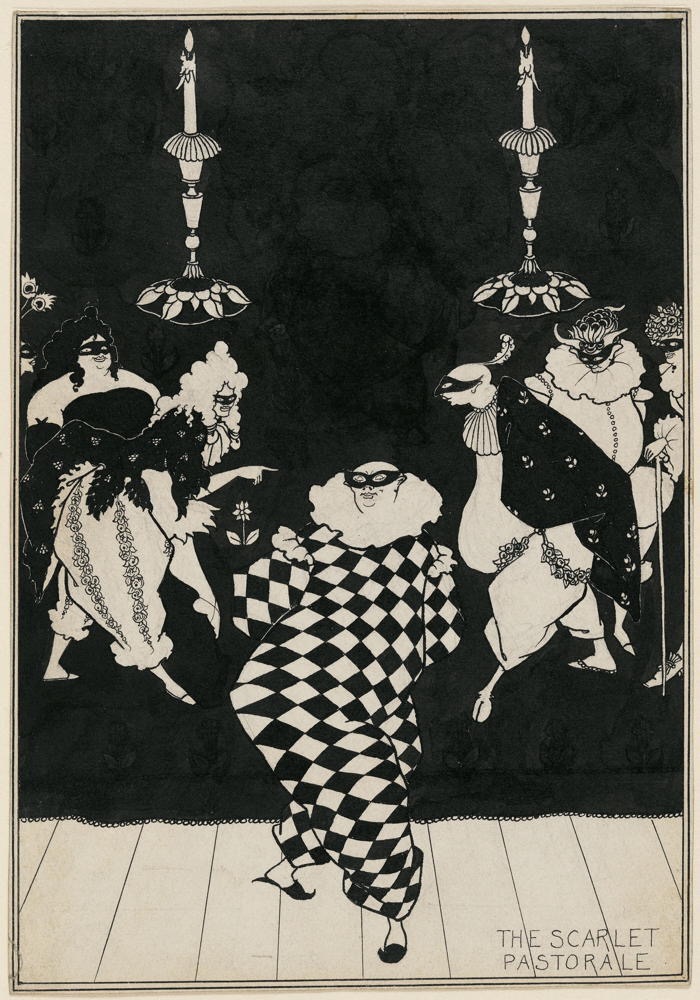
Aubrey Vincent Beardsley: The Scarlet Pastorale (1894)
"…those of us daily struggling to live decent lives in these extraordinary times."
What does Decency demand of me now? This seems to be the question reverberating in my head most mornings. I find no definitive answer. If I were a martyr, I might more easily find such a response, for I would know without a doubt that Decency desperately desired me to become a victim to whatever provocation I might encounter. But Decency does not seem to want me to be placating situations. It wants me to be true to myself, too, to stand up for something. It sometimes seems that my Decency and I are witnessing especially horrible provocations, ones specifically engineered to elicit something approaching my very worst responses. They seem to desire my anger. They frustrate me with double-binding insistences. They do not appear above outright lying just to bring out my worst responses, and, believe me, I have been frantically sorting through alternatives. The Decency question resonates even more strongly the longer I consider my options.
The eight-year-old in office has mastered nothing more interesting than fabricating.
Situationalism
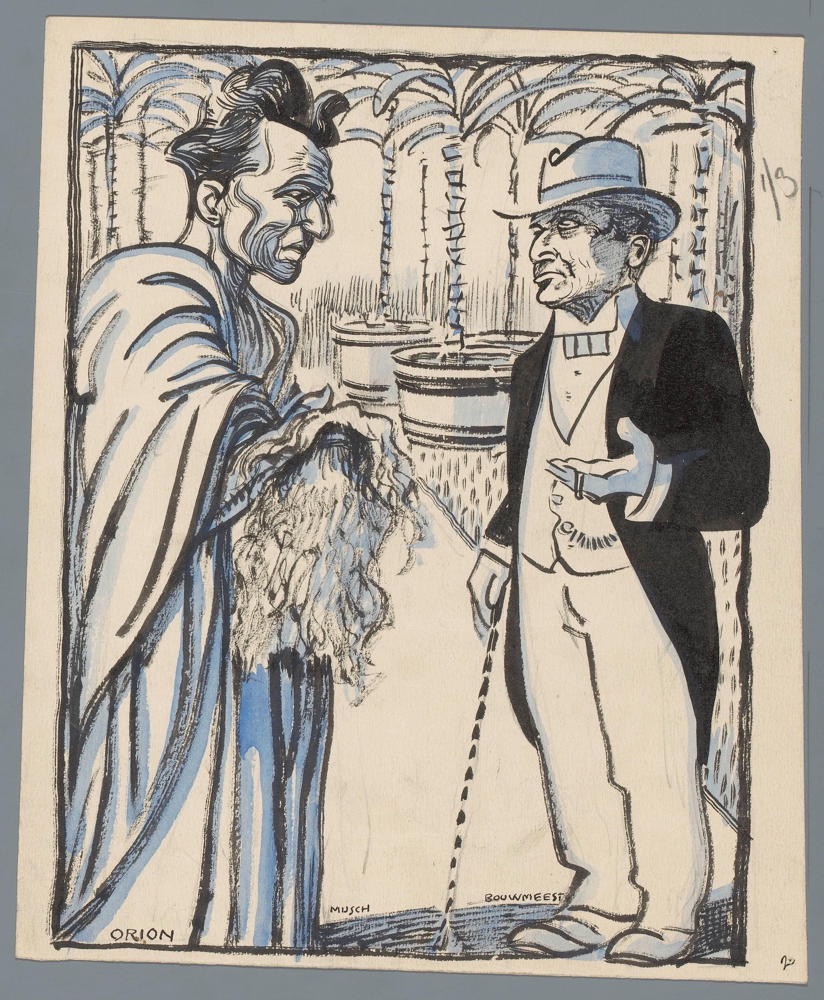
Patricq Kroon: Musch and Bouwmeester (1900 - 1924)
The actors Jan Musch and (Louis?) Builder in conversation with each other. Design for a cartoon in the newspaper.
"Perhaps I should be indicting myself."
Maybe Decency should only be exercised situationally. Perhaps it’s a Sunday sort of behavior. Certainly, considerable ambiguity surrounds its appropriate use. One might not want to waste any on enemies, for instance. Perhaps only certain people are qualified to receive it, and maybe not everybody’s fully certified to properly dispense it. Maybe it requires some skill to properly deploy. Should rank amateurs even be allowed to engage in it? What if they were to accidentally extend some Decency to someone unqualified to receive it, someone, for instance, who couldn’t properly appreciate it? Couldn’t the resulting misunderstanding leave the world worse off for the experience? Might indiscriminate Decency cause real and lasting damage, not only to the practitioner but also to the unwitting receiver? What if we inadvertently spoil some hapless receiver into expecting to always receive Decency in a naturally hard and increasingly indifferent world?
I might needlessly worry about such questions.
Weekly Writing Summary For The Week Ending 09/25/2025

Jack Gould: Untitled [woman writing numbers on blackboard] (c. 1950)
We Must Embody It Now
Imaginary Enemies might be the most virulent kind. There’s no physical way to defeat them. They can only ever be conquered by other means, often through cognitive means. This means that those most likely to conjure up Imaginary Enemies usually prove to be the ones least able to vanquish them. They escalate defensive measures far beyond reasonable levels instead, often inflicting greater damage upon themselves than any enemy, imaginary or actual, could ever manage. Failure to deflect the imaginary only rarely uncovers the illusion, for only clear victory could convince the thoroughly deluded, and Imaginary Enemies wickedly withhold such clarity. It seems as though a clever conspiracy prevents unambiguous evidence from emerging. The afflicted slowly suffocate in their own ambiguity, chasing shadows of their own activity, unable to distinguish between actual and imagined.
A grave injustice might prove to be the only means by which Imaginary Enemies are ever vanquished.
SearchingForDecency

Antonio Tempesta: Canens Searching for Picus (1606)
"It seems likely to be taken down by defensive friendly fire."
Hoping to gain a better understanding of Decency, I initiated a Google search for “Decency In The News.” I received in return references and explanations that didn’t even attempt to define Decency, or even to provide current examples of it in action. I found instead lengthy descriptions of what Decency isn’t, how it so often seems missing from online conversations, and how Section 230 of the Communications Decency Act has done little to encourage Decency in online forums, though it has successfully shielded platform owners from lawsuits for such offenses as third-party slander and copyright infringement. “Reports about ‘decency’ in the news consistently focus on its erosion in politics and society, though the Communications Decency Act also remains a topic. Current conversations often frame a decline in decency as a symptom of deeper societal issues like incivility and political polarization.”
One deeper societal issue, aside from the obvious incivility and political polarization, might be the apparent unspeakability of Decency.
ReWired

Lee Russel: Trailer of itinerant electrician near Pharr, Texas (1939)
Farm Security Administration Photographs
The Miriam and Ira D. Wallach Division of Art, Prints and Photographs: Photography Collection, The New York Public Library. "Trailer of itinerant electrician near Pharr, Texas" New York Public Library Digital Collections. Accessed September 24, 2025. https://digitalcollections.nypl.org/items/8e15f900-c4fb-0136-ce6e-438981b45b1b
"…it might take such work to set the circuits straight again."
I realize that I have been ReWired. Whether I believe the bullshit or not, and perhaps especially because I don’t believe it, either conclusion could serve as evidence that a successful rewiring has occurred. I wish, and even pray, in my curiously agnostic way, that this situation were otherwise, that my defenses had not been compromised, but I have lately realized that there was no avoiding this experience. Yes, I refused to watch Fox from its inception, except for a few otherwise inaccessible baseball games they alone televised, because I firmly believed that exposure to that poisonous content might rewire my judgment. I had not suspected that just deciding to tiptoe around it was also evidence of its backhanded success. Its premise might have scared me off, but it also motivated me to build a fence around my property to maintain an isolated Dignity, when Dignity rightfully knows no such boundaries.
The insidious nature of shriveling morals affects even the morally steadfast.
D-Scrolling

Sebald Beham: Little Buffoon with Scroll (1542)
"Curious how there's so much more effort expended trying not to do something than there ever is to simply repeating it."
We refer to this activity as Doom Scrolling, the practice of aimlessly perusing online media. The scrolling part of the term seems more self-explanatory than the doom portion. The doom comes from the general content found on social media. It tends to be overwhelmingly focused on the catastrophic. On slow news days, plenty of past catastrophes appear to hold the space. Scientists—real scientists, not the phony ones currently enjoying a resurgence on social media—suggest that each exposure to a report of some catastrophe incites something in our brain to dispense an addictive substance that encourages us to continue engaging in the hope of stumbling upon another similar report. Doom apparently better excites the amygdala suspected of dispensing this addictive substance than do more uplifting kinds of content. Fuzzy kitten and fluffy baby duckie pics work to some extent, but apparently not nearly as well as catastrophe.
It's nothing personal.
Decency

Follower of Jan Massys: Two Peasants Looking at a Mirror (c. 1550)
"I will be investigating this notion between now and just before Christmas."
We insist that we are decent people, charitable to a fault. We rail against indecency as if it were the obscenity it always was. Yet we engage in the occasional absolutely indecent activity. We're currently, under the direction of our administration, which, thankfully, cannot administer anything, deporting people without due process. They're initiating, in our good name, a raft of initiatives Decency prohibits. Yet they're still proclaiming from every pulpit just how deep down Decent they are, and we remain.
Maybe Decency is something other than what we've always assumed it was.


